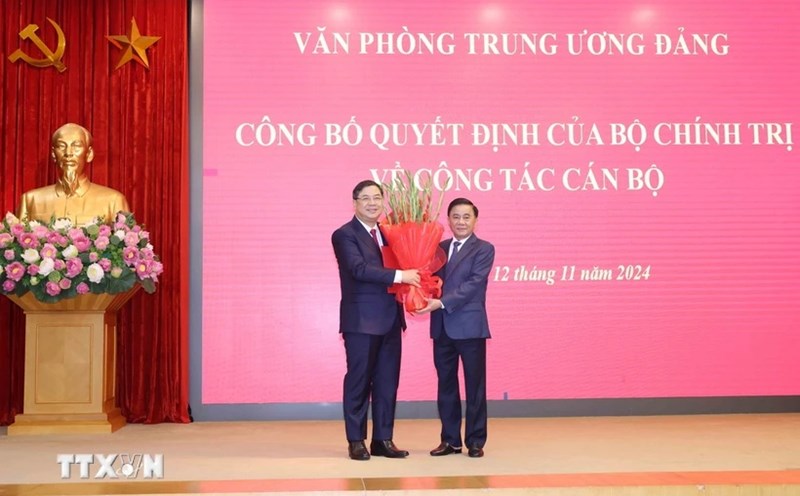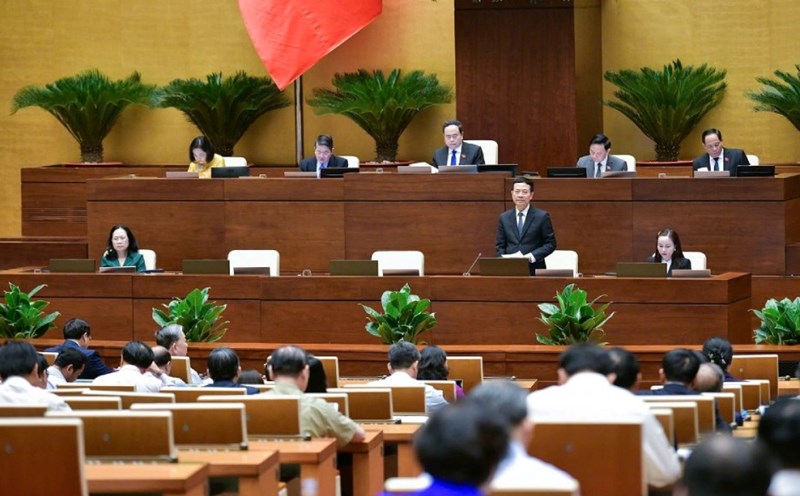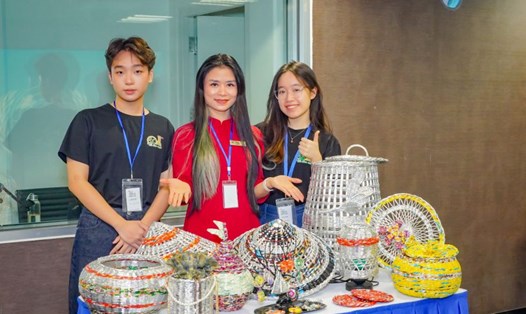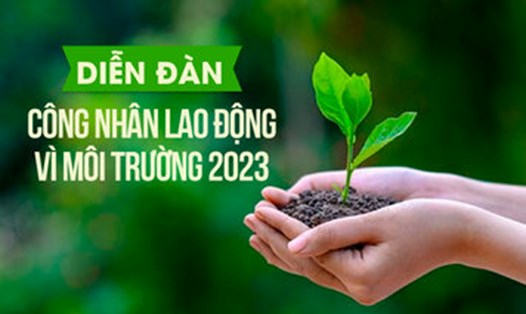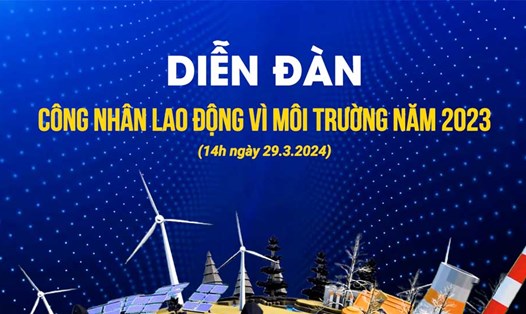17:10: In his closing speech, Mr. Nguyen Duc Thanh thanked the representatives of the Ministry of Natural Resources and Environment, the Vietnam General Confederation of Labor, businesses and a large number of workers who attended the forum. Mr. Thanh emphasized that each worker is an important factor in turning trash into gold, and to achieve the goals of environmental protection, workers and laborers are the key factor.
17:06: A representative of the Textile and Garment Trade Union asked: "According to the Institute of Occupational Safety and Hygiene (Vietnam General Confederation of Labor), regarding the results of occupational safety and health service activities and labor environment protection, the institute's units have conducted environmental monitoring up to 2022 for 7,577 units, and it is estimated that by the end of 2023, environmental monitoring will be conducted for about 8,805 units. The monitoring results show that about 32% of the monitored units have at least 1 harmful factor that does not meet labor hygiene standards. So how can we reduce harmful factors that do not meet labor hygiene standards?".
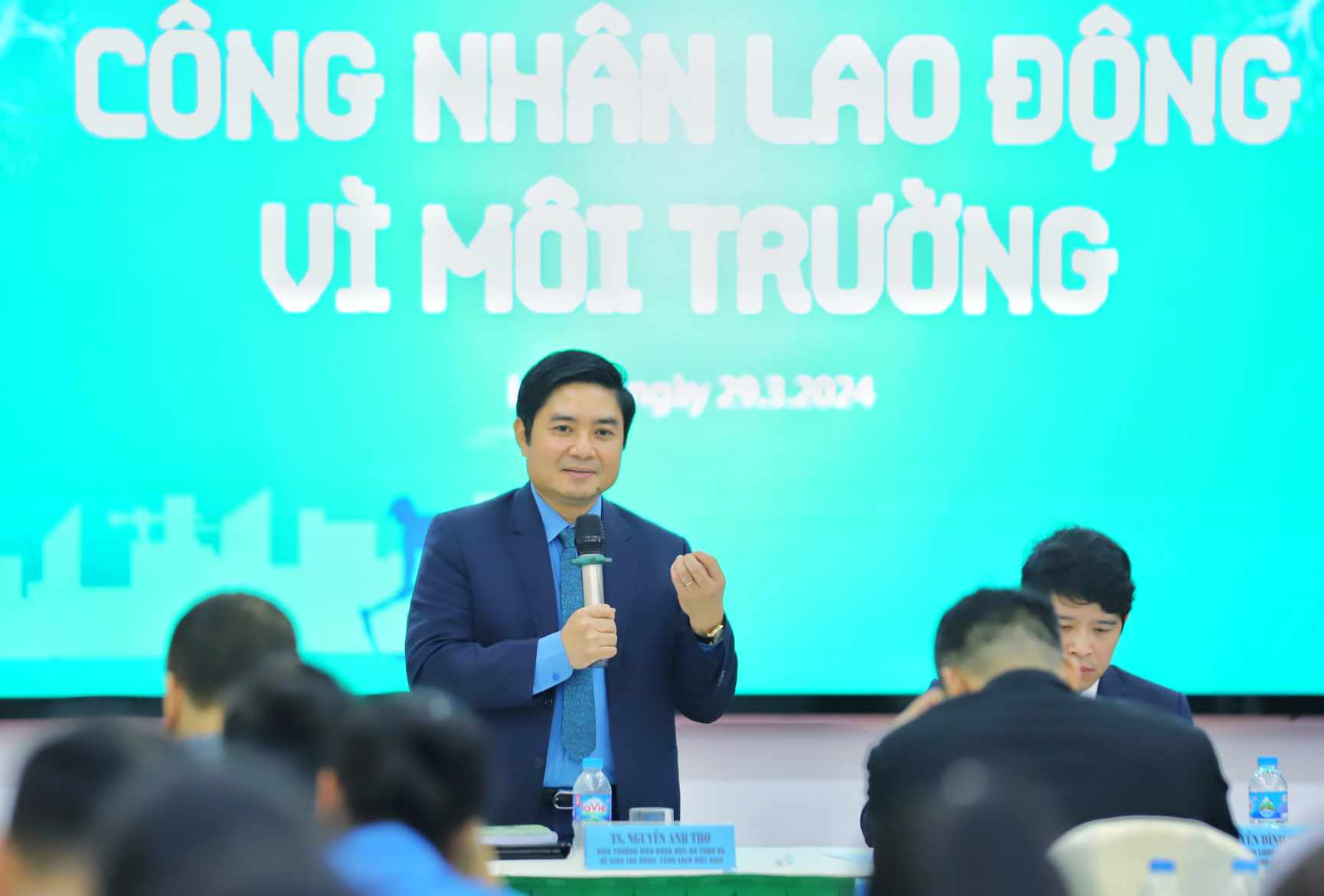
Dr. Nguyen Anh Tho - Director of the Institute of Occupational Safety and Health Science - said that currently, according to the law, all businesses that employ workers must annually monitor the environment, especially factors such as chemicals, wind speed, climate change, light, etc. As the economy grows, we have many new economies, millions of new chemicals, new equipment going into production, but that also puts pressure on the environment.
Therefore, the results of environmental monitoring have contributed to advising and helping businesses implement measures to improve the environment and working conditions, minimize the negative impacts of harmful factors to help prevent occupational diseases. During the monitoring process, a number of new factors have also appeared in the working environment for which Vietnam has not yet regulated occupational exposure thresholds. This is the basis for proposing to supplement and update the list of occupational exposure thresholds for these new harmful factors.
“A very modest number of nearly 10,000 enterprises conducting monitoring is too little compared to a country with tens of thousands of manufacturing enterprises out of a total of more than 900,000 enterprises nationwide. We are sitting here with many environmental factors that need to be assessed, however, it can be said that there are a few factors that do not meet the requirements, exceed the threshold, depending on the type, so we need to overcome them.
Many businesses, especially those related to chemicals and heavy metals, do not have enough equipment to evaluate, and lack an analysis system to find out what is in the environment, which is not easy at all. In developed countries like Korea, Germany, and the US, finding is still difficult, but in Vietnam we can only do a small part. The responsibility of the Ministry of Health, the Ministry of Labor, War Invalids, and Social Affairs, and research agencies is to speak up to contribute to improving the capacity of the units. Strengthen specialized equipment for environmental monitoring; change safety management in the new context.
17:04: Ms. Linh Thi Loan (Urenco worker) wondered: "During the working process, many people do not care about garbage disposal, do not know the garbage disposal time, when propagating to the residential group, many people do not care. Sanctions are still quite few and the garbage classification programs are mostly done by environmental workers themselves. I hope experts will advise on solutions to make it easier for workers?".
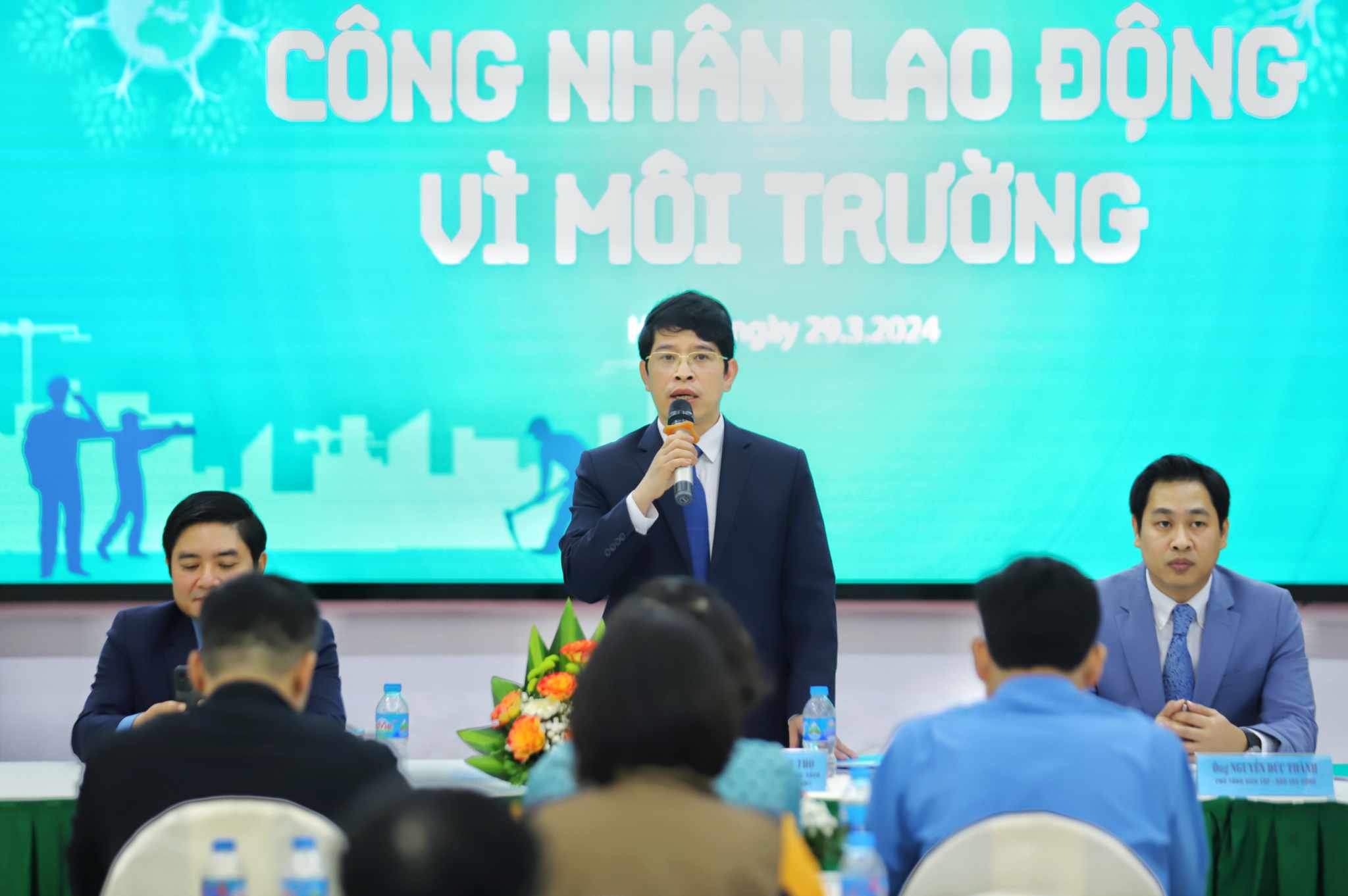
Associate Professor Nguyen Dinh Tho explained: "Today's forum is also an inspirational session in environmental protection and climate change response. The Institute of Strategy has many programs to bring source waste classification to schools and households. We also require two options for people to implement well, on the one hand we propagate and mobilize, on the other hand there are also sanctions such as if we emit waste, we have to pay for it.
In the coming time, we will first implement sanctions related to waste classification from 500,000 VND to 1 million VND. At the same time, we will propagate to people to throw garbage on time and in the right place. In addition, there will also be forms of propaganda at universities and high schools so that students can go back and propagate to their families.
I also hope that environmental workers and authorities will remind each person when they see people not throwing trash on time and in the right place. I hope we will do well so that in the future when people throw trash on the street, they will feel uncomfortable and then when they see trash, they will pick it up and throw it in the right place. I hope we will achieve this goal."
16:50: At the forum, Ms. Nguyen Thi Hong - a worker at Hanoi Urban Environment Company Limited (URENCO) Hoan Kiem branch - asked, "Vietnam is committed to reducing net emissions to zero by 2050, so what should workers like us do, what do we need to do to achieve that goal?".
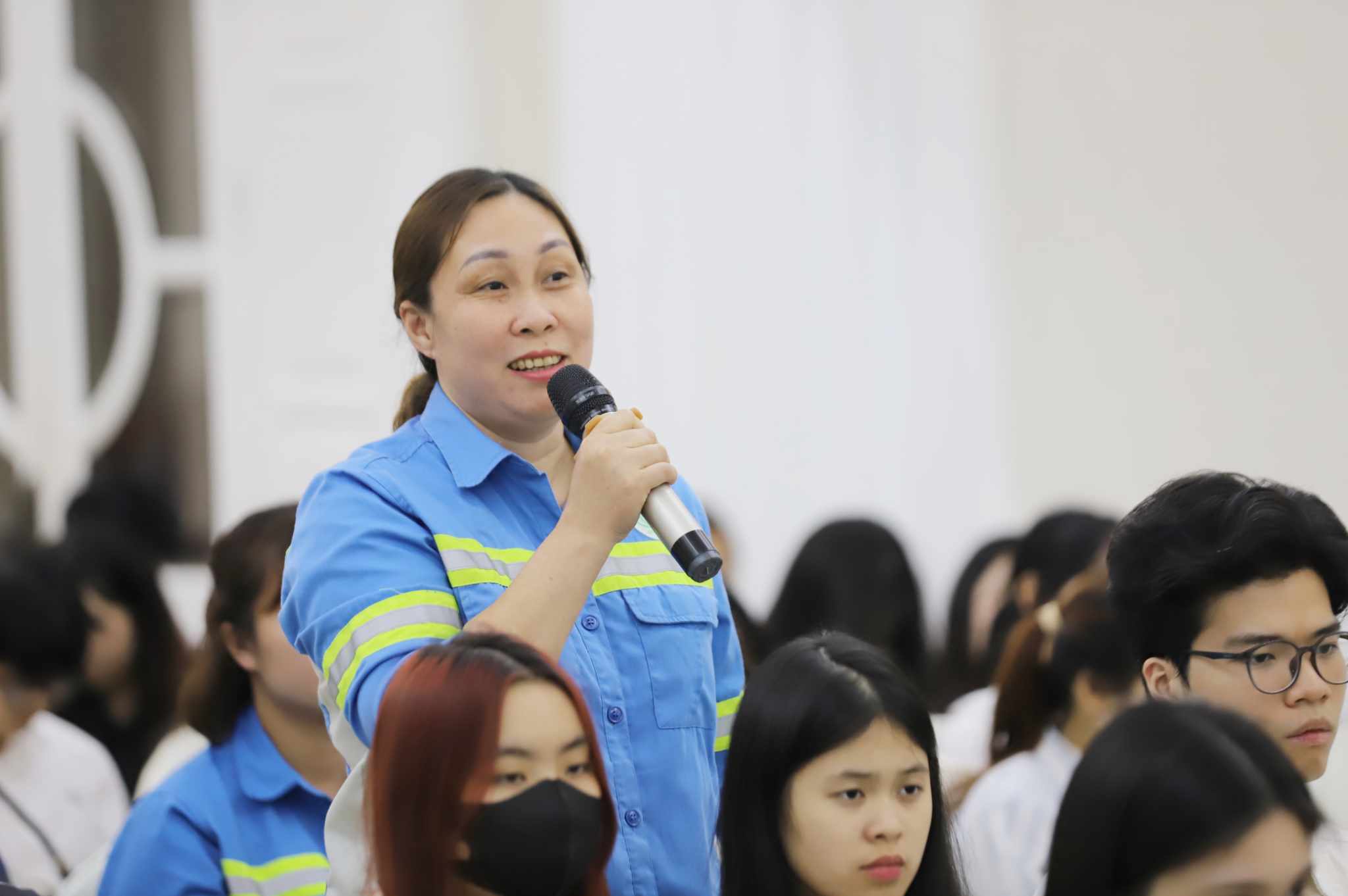
Responding to the female worker, Associate Professor Dr. Nguyen Dinh Tho - Director of the Institute of Strategy and Policy on Natural Resources and Environment - said that up to now, we have used water, land, and air for free. However, now and in the future, we will have to pay for using these resources.
“In the coming time, we will have to pay for carbon credits, pay for dumping waste, causing environmental pollution. Our goal is to increase carbon absorption, from forests, from the sea also absorbing carbon. The quality of carbon credits depends largely on forest protection units, ensuring safe conditions for the quality of life of workers and laborers. This is a dual goal. Carbon credits will be sold at a high price, an average of 100 - 150 USD/1 credit, even higher if the community improves the quality of life, businesses improve the quality of life for workers…”, Associate Professor Nguyen Dinh Tho said.
According to Associate Professor Tho, workers play a very important role in creating quality carbon credits. Workers make efforts and join hands with the community to reduce greenhouse gas emissions, CO2, thereby creating quality carbon credits. That is the way for workers to work in the roadmap to reduce emissions to zero by 2050.
16:44: Workers from the Vietnam Textile and Garment Trade Union asked: "After 5 years since the Prime Minister launched the movement against plastic waste, we workers have also made changes in our daily life and production. However, we currently see some problems with single-use plastic replacement products that are not yet popular. I would like to ask the representative of the Ministry of Natural Resources and Environment what solutions we have?"
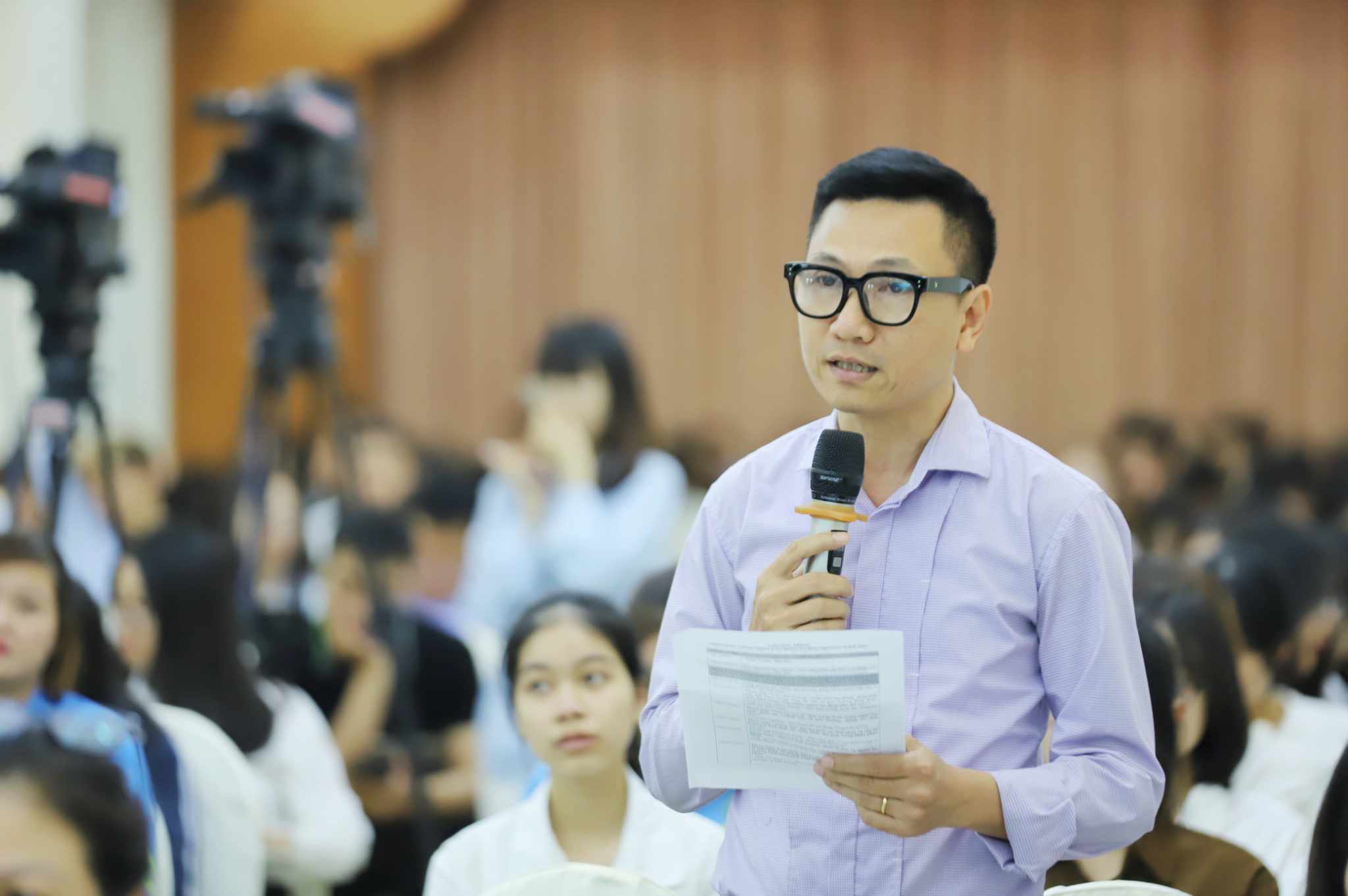
Associate Professor Dr. Nguyen Dinh Tho explained that textile workers are also one of the groups required to implement a circular economy and reduce waste in the coming time. The requirement related to the green transition to a clean economy is not only a requirement of the textile industry but of the entire economy.
"Reducing plastic waste is a huge problem. In the coming time, when faced with reducing waste, reducing pollution and increasing biodiversity, it will also be a challenge for businesses. The world will monitor how much plastic we import and recycle. If we import plastic production but do not collect and recycle it, we cannot export it.
"Tracking the plastic footprint in the coming time is a solution but also a challenge for both our people and government in our commitment to reducing plastic waste," Associate Professor, Dr. Nguyen Dinh Tho emphasized.
16:37: Workers and laborers participate in the forum to ask questions that need to be resolved.
Ms. Nguyen Thi Nu - an environmental worker at the Hanoi environmental company - asked: "At the end of this year, the 2020 Environmental Protection Law requires localities to have a plan to classify waste. How are localities doing it now? What plans do they have to make it easier for us workers when collecting?"
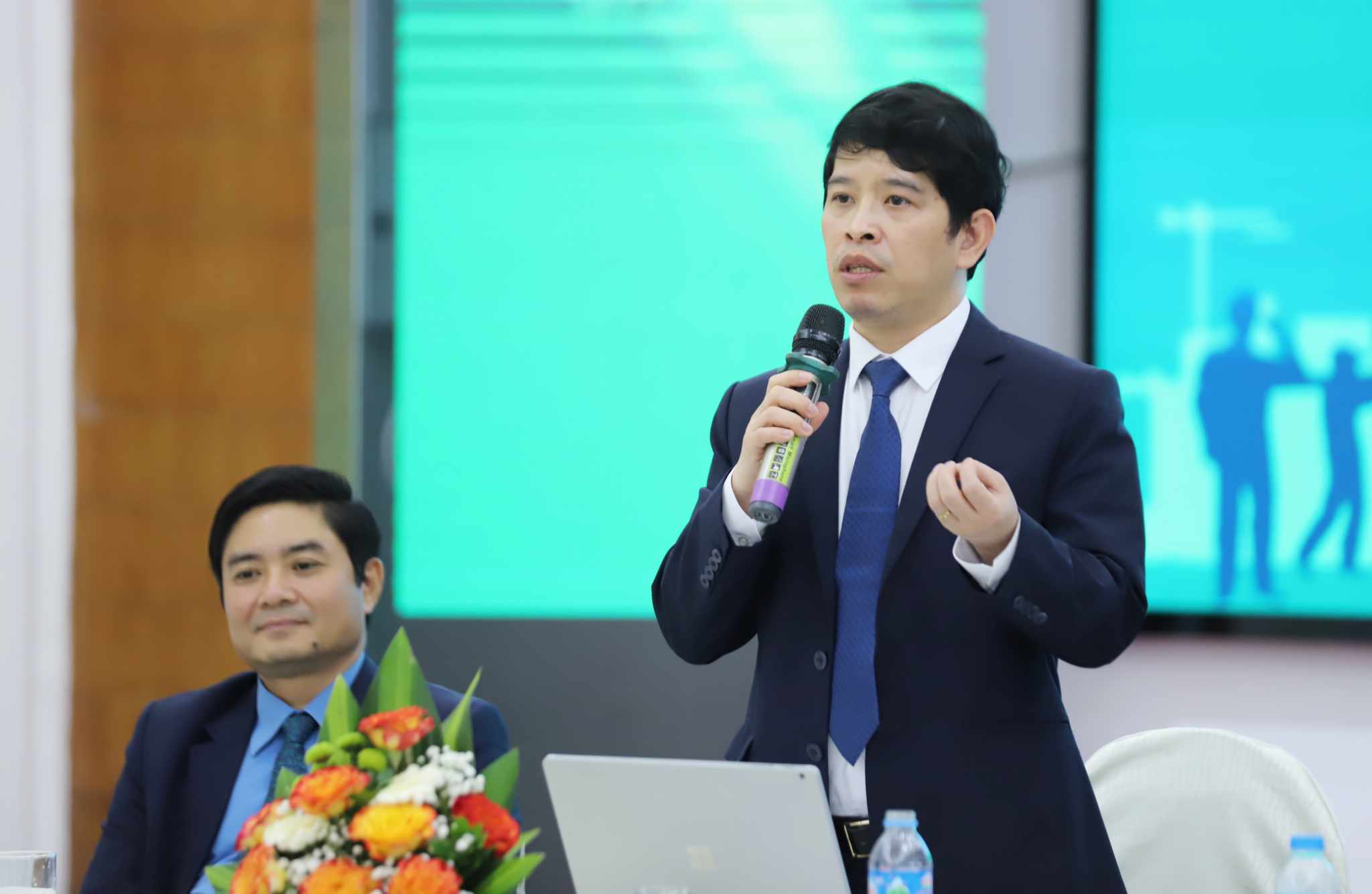
In response to this question, Associate Professor Dr. Nguyen Dinh Tho shared that the Law on Environmental Protection has been in place since 2020 and has provided a very clear roadmap for localities to implement. One of the requirements is to improve the knowledge of collectors and classifiers. This is a big challenge for Vietnam as the world has been implementing it for a long time.
"In Vietnam, it will be very difficult for us to implement in the coming time. Some apartment buildings have started to put two trash bins, but getting households to sort their trash before throwing it away is also a big challenge. Besides organic waste, we have other types of waste such as electronic waste and other bulky waste... and we do not have enough scale to recycle and use it at an industrial level. This is definitely a very big challenge, especially in big cities like Hanoi and Ho Chi Minh City," said Mr. Tho.
At the same time, Ms. Hoang Thi Bich Hanh - Vice President of the Trade Union of Hanoi Urban Environment Company Limited - also added that since 2015, Vietnam and Japan have had a program to classify waste at source, Urenco has piloted it in Phan Chu Trinh ward. However, after a while, the program has not been really effective because people's awareness is really not high.
"Currently, Urenco is working with 18 wards of Hoan Kiem district to propagate to each household. For this program, we are working and gaining experience and will have specific reports. Currently, we really need the authorities, Uren company and people to work together to classify waste at the source. We may not be able to do it overnight, but gradually people will become aware so that those who collect and recycle will have less difficulty and hardship," said Ms. Hanh.
In addition, another difficulty is that some types of waste that have not been collected for recycling, such as nylon, are mainly buried. "We hope that in the near future, experts will have suggestions to work with the government and people to better protect the environment," Urenco representative suggested.
16:20: Instead of ending up in the trash or wandering around the environment, instant noodle packages will live a new life.
As someone passionate about protecting the environment, with the concern of not wanting instant noodle packaging to end up in the trash or wandering around the environment, Ms. Vu Thi Thao - a physical education teacher at Vinschool High School (Hanoi) - along with her students recycled handbags and pencil cases from instant noodle packaging with the "green instant noodle" project.
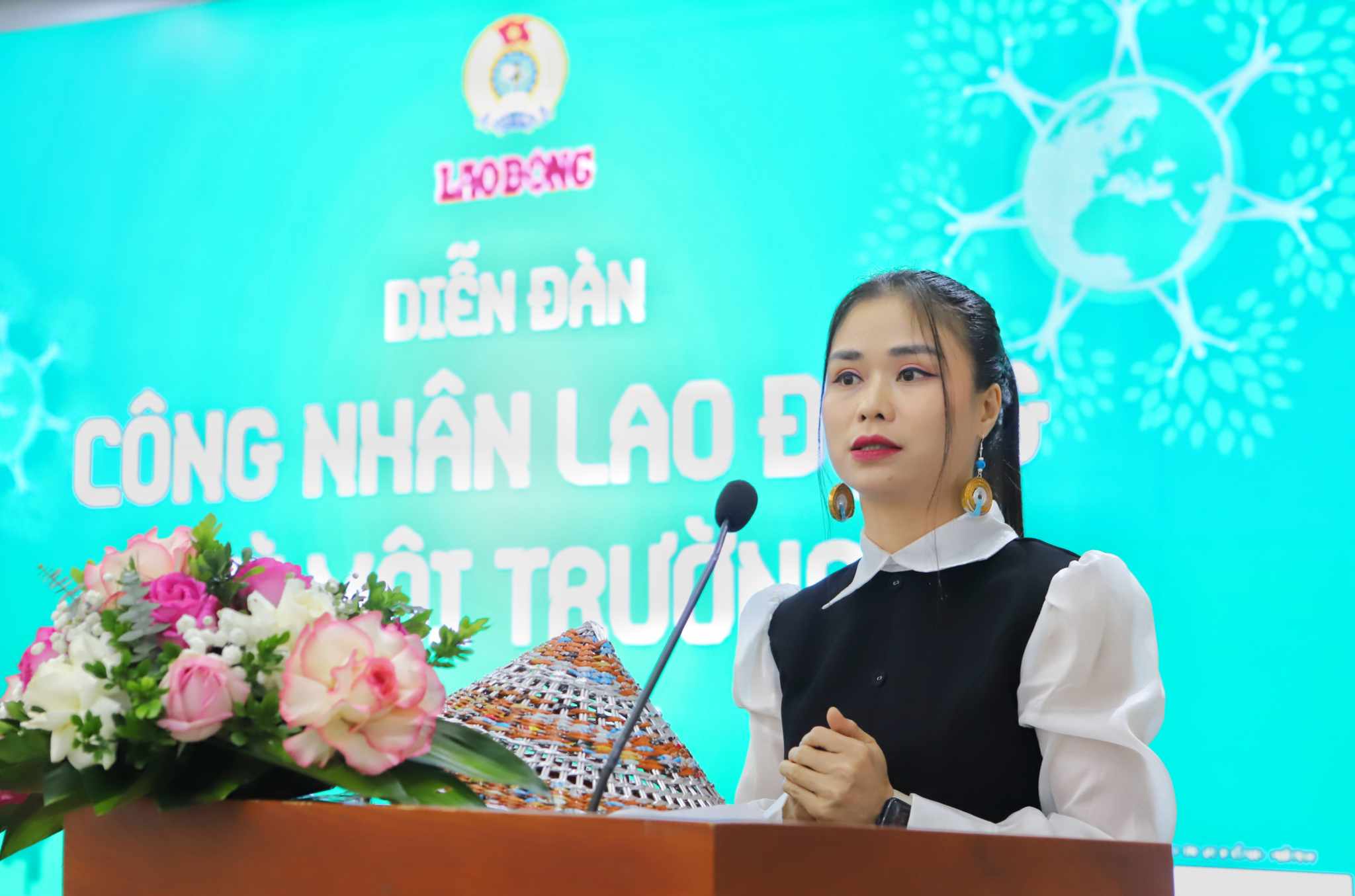
To create products from instant noodle packaging, there are 4 steps: Collecting noodle packaging from the community - processing and cleaning - creating yarn from noodle packaging - designing and weaving according to the bamboo and rattan weaving formula to create the product.
During the 4 years of the project, the club has been operating regularly at the school every Thursday afternoon after school. In 2023, the project successfully trained the Hope Vocational Training Center for the Disabled in Hue.
Attending the forum "Workers for the Environment 2023", teacher Vu Thi Thao said: "What I try to bring is knowledge, culture and a circular lifestyle. Not only knowledge about the subject I teach, but also knowledge about life and society, about how children can face global change, that is a healthy lifestyle, contributing to society, to those less fortunate than us. That is what a worker like me always aspires to be able to do for my students".
According to teacher Vu Thi Thao, protecting the environment is not the responsibility of any individual but of all social classes. Especially for the younger generation, the youth generation, awareness of responsibility to the environment and the community is even more important.
Along with the mission of protecting the environment and reducing plastic waste, the Green Noodles Project always aims to educate the skills and qualities of today's young generation. From small actions, we can have a big impact on the community, bringing enormous values in terms of economy, culture, education, and environment.
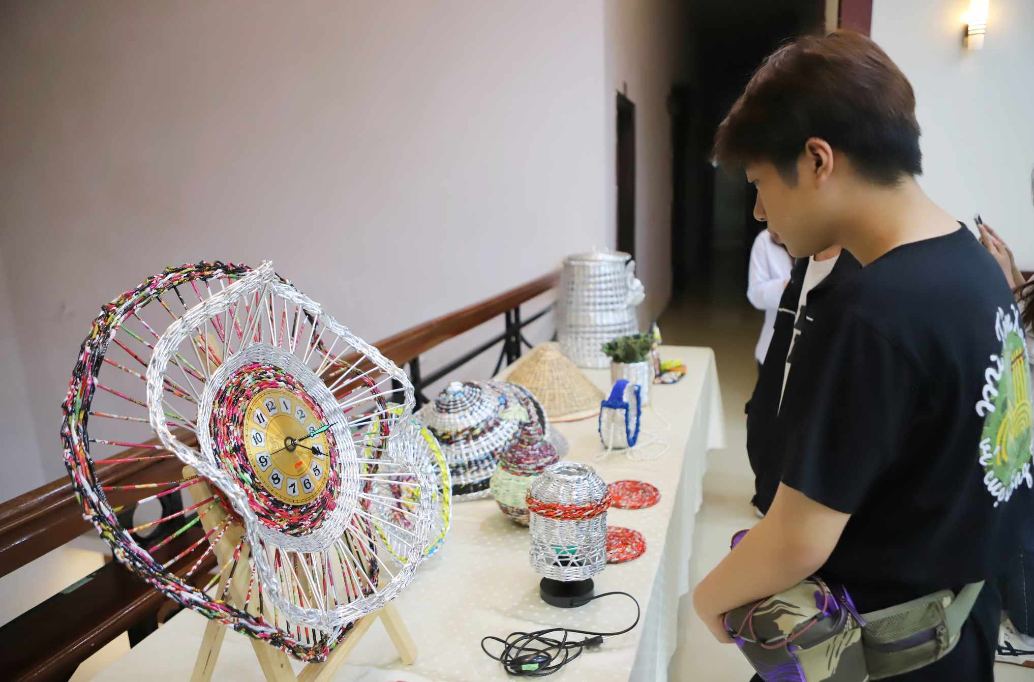
16:07: Mr. Nguyen Thai Duong - Vice President of Vietnam Textile and Garment Trade Union - said that implementing Resolution 24-NQ/TW dated June 3, 2013 of the Central Executive Committee on proactively responding to climate change, strengthening resource management and environmental protection, over the past years, in addition to caring for and protecting the legitimate rights of workers, Vietnam Textile and Garment Trade Union has carried out many activities to promote the active participation of grassroots trade unions, enterprises and mobilize workers to work on environmental protection throughout the system.
Every year, the Vietnam Textile and Garment Trade Union issues plans and guides grassroots trade unions to hold rallies in response; conduct training, propaganda, and dissemination to raise awareness and consciousness among union members and workers about the Party and State's policies on environmental protection. Organize activities to raise awareness among union members and workers about reducing the use of plastic waste; build a sustainable lifestyle in harmony with nature; rationally use natural resources, biodiversity and adapt to climate change, towards greener and cleaner production and consumption; promote the construction of a green economy, circular economy and sustainable development.
The Vietnam Textile and Garment Trade Union directs and guides grassroots trade unions to strengthen inspection and supervision activities on the implementation of the provisions of the 2020 Law on Environmental Protection by employers (for production and business establishments) such as the collection and treatment of wastewater to meet environmental protection requirements; Collection, classification, storage, reuse, recycling, and treatment of waste; Minimization, collection, and treatment of dust, emissions, and unpleasant odors; ensuring no leakage or emission of toxic gases into the environment; control of noise, vibration, and light; Conducting monitoring of wastewater, dust, and emissions according to regulations...
At the same time, launch emulation movements to mobilize workers to clean the environment, plant trees, collect, classify, and treat household waste and plastic waste at the source, preserve the landscape of enterprises, agencies, and factories; promote the movement "say no to hard-to-decompose plastic bags and disposable plastic products"; promote the collection, recycling, and reuse of hard-to-decompose plastic bags and disposable plastic products; encourage consumers to use environmentally friendly products; Coordinate with businesses to actively respond to the Prime Minister's Project "Planting one billion trees" for the period 2021 - 2025; improve the quality and effectiveness of the "Green - Clean - Beautiful, ensuring safety and hygiene at work" movement. Discover, commend, and reward individuals and groups with outstanding achievements and initiatives in environmental protection activities; especially solutions and initiatives to reduce plastic waste.
Strengthening propaganda, monitoring and many other practical activities have had a positive impact on the awareness, viewpoints and behaviors of subjects in environmental protection, from employers to all employees.
Through propaganda, mobilization and practical solutions in environmental protection implemented at grassroots trade unions, the viewpoints and awareness of employees have been changed, creating positive behaviors of employees in environmental protection. The regulations of enterprises on waste classification at source have formed good habits for employees not only at the production site but also applied by employees at their residence and in daily activities.
Most employees know how to identify hazardous waste in the production and business of enterprises such as machine oil rags, waste fluorescent lamps, waste oil, waste ink, sticky packaging containing hazardous components, waste from the sizing process with organic solvents... to classify, collect and treat according to regulations. Many employees have been aware of reducing disposable plastic items (bottled water) by using personal water bottles at work, replacing environmentally friendly items in daily life (using paper boxes instead of plastic bags), participating in battery collection and exchange programs for used batteries launched by local organizations and places of residence...
In addition, employees of many enterprises actively participate in programs of the Youth Union of enterprises and localities to plant trees at production sites, collect waste, dredge canals, collect plastic waste along the coast (in localities with canals, seas, etc.). Many employees implement and mobilize colleagues and families to respond to the "Earth Hour" program, practice saving electricity in performing tasks at the workplace and family living areas.
Over the past 10 years, the Vietnam Textile and Garment Trade Union has awarded nearly 130 collectives and individuals with outstanding achievements in the emulation movement "Green, clean, beautiful, Labor safety and hygiene". Many solutions and initiatives of collectives and individuals in production and business, associated with environmental protection, have been honored, rewarded, replicated and spread throughout the system.
16:05: Mr. Do Ba Quan - Chairman of the Board of Directors of Tri Nam Digital Transport Joint Stock Company (Tri Nam Group) - said that from 12. 2021 to 14. 3. 2024, the public bicycle system of this enterprise has cycled 6,896,456km, equivalent to 7,973km/day; reducing 879,988 kg of CO2 into the environment, equivalent to 42,307 trees.
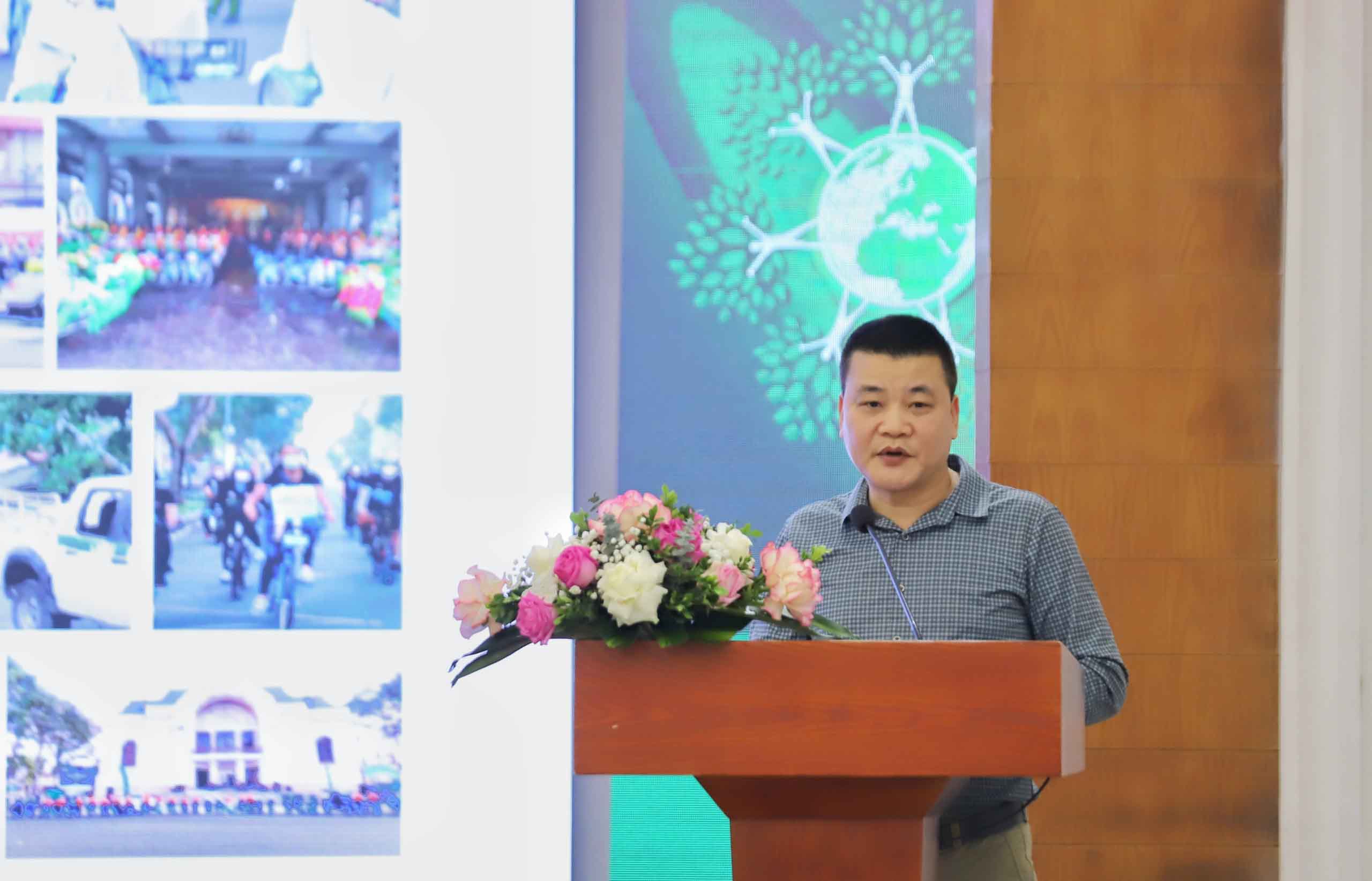
Regarding the effectiveness of public transport connections, according to Mr. Quan, Tri Nam's digital bicycles will access bus stations, BRT, and Metro routes, of which the number of stations is 113/295 bus, BRT, and Metro connection stations, with the number of trips being 460,841/1,400,731 bus, BRT, and Metro connection trips, accounting for 32.9% of the total number of trips.
Talking about the popular solution, educating environmental protection awareness to staff, workers, union members, Mr. Quan said that the Union coordinated with the management units of the Group to popularize and educate internal awareness of Tri Nam with the following solutions: Using the TNGo platform to provide daily information about the environment, reduce carbon emissions: create the habit of cycling instead of personal vehicles such as motorbikes, cars. Organize decoration of the workplace with posters, slogans about environmental protection through practical activities: saving electricity, water, recycling paper.
Provide free TNGo public cycling packages for Tri Nam staff. Establish carbon-free travel clubs: cycling club, running club. Organize responses to all environmental days: Earth Hour, Environment Day, World Cycling Day...
Build a workflow on a self-built application - website platform to minimize the use of paper (natural resources). Build a green, environmentally friendly office with plants placed at desks and in hallways; regulations on waste classification and recycling.

The Union cooperated with units such as LiveLearn, Green Generation, and Provincial Youth Unions to organize many environmental competitions: 20,000km of green for a safe city in Hanoi, Green Check-in with buses, bicycles, metro, and walking on the TNGo platform.
Using internal fanpage, TNGo app, internal website to convey daily information to staff about carbon reduction, environmental protection...
“Every month, every quarter, every year, the Union and the company honor individuals and units in the group with new solutions and initiatives to improve labor productivity in the direction of intelligence - technology. Develop a set of regulations on encouraging the development of initiatives applicable to individuals and groups in the following contents: initiatives on products and services; initiatives on working tools/means;... which are directly evaluated by the Group's Board of Directors, the Union organization, and related units,” said Mr. Quan.
15:48: Associate Professor, Dr. Nguyen Dinh Tho presented the paper "How is the environmental protection orientation, towards the goal of zero net emissions by 2050 being implemented?".
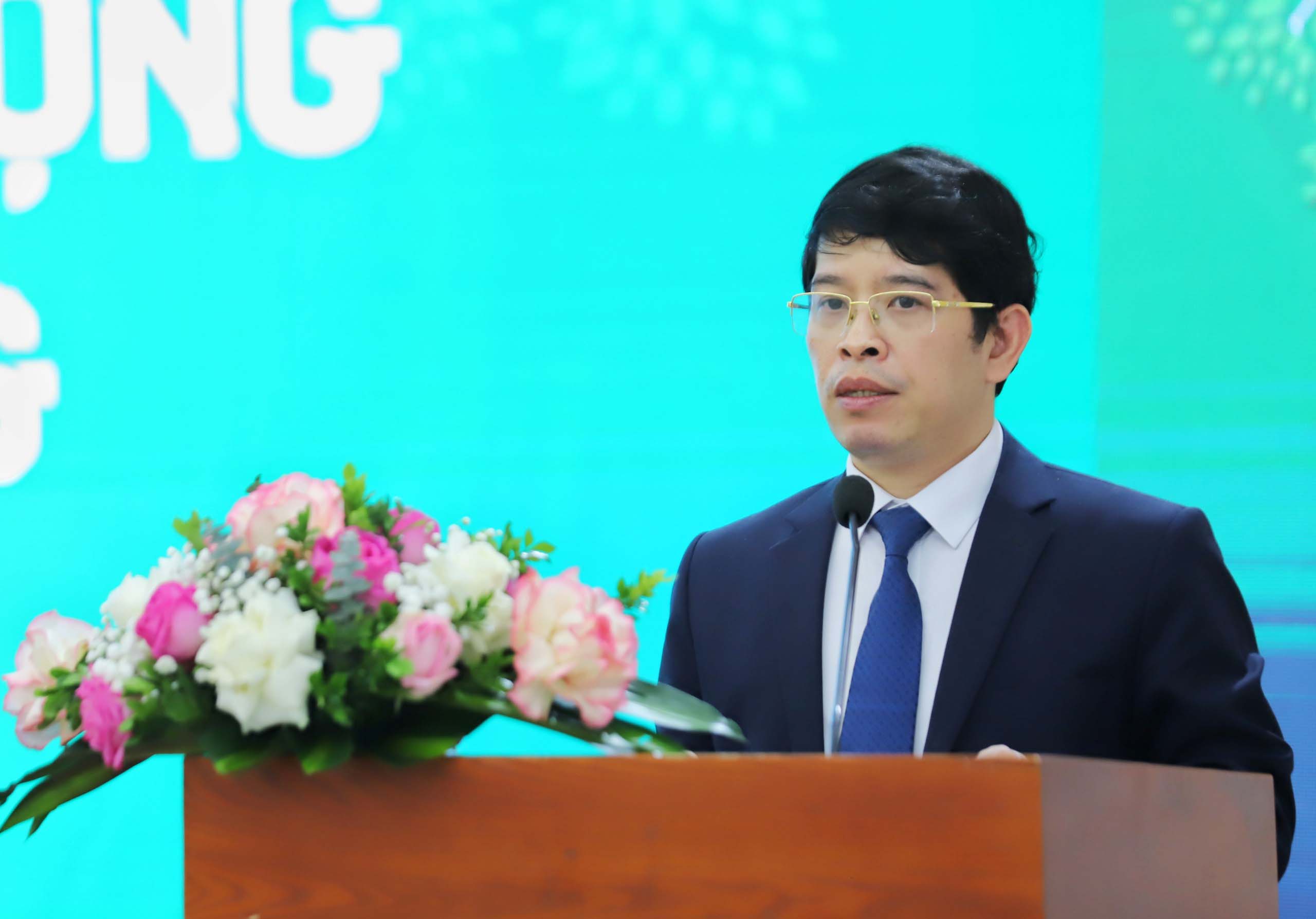
Climate change (CC), resource degradation, environmental pollution and biodiversity loss are major, global issues that have been changing natural ecosystems and socio-economic life around the world, becoming one of the biggest challenges for humanity in the 21st century. Responding to CC, resource management and environmental protection (EP) are vital and decisive to the sustainable development (SD) of each country and nation.
Circular transformation, green transformation, green economic development, low carbon to achieve net zero emissions by 2050 is the trend of the times, an inevitable development orientation globally.
Domestically, natural disasters, climate change, resource depletion, and environmental pollution continue to occur, threatening the country's sustainable development. Vietnam has committed to zero net emissions at the COP21 Conference, and has been promoting the implementation of a circular economy, equitable energy transition, and ecosystem restoration. Our Party is steadfast in its policy of rapid and sustainable development, aiming to become a high-income, prosperous, and happy country by 2045; and is also an active and responsible member in solving global issues.
However, the awareness of the whole society about green transformation is still inconsistent and incomplete; the legal system is not complete, still lacking and overlapping; resources and participation of the whole society, especially the business community, are still limited...

Currently, many businesses, especially those with export markets to countries with regulations on low-carbon goods and green products, as well as start-ups, tend to invest in green. In addition, some eco-industrial park models such as Nam Cau Kien Industrial Park in Hai Phong City; low-emission production models (for example, low-emission rice cultivation; low-emission construction material production models, etc.) have been deployed in Vietnam.
There are many reasons for businesses to adopt green production and business models. In my opinion, the important reason is that the market or consumer demand forces businesses to change their production and business models to be more suitable and sustainable. For example, Vietnam's textile and garment industry has recently faced competition from Bangladeshi enterprises - the reason is not the productivity or skills of workers but because their textile and garment industry has shifted to using clean energy, green energy or in other words, they have shifted to a greener production model (at least in terms of energy use) and meet the requirements of export markets such as the EU...
The Ministry of Natural Resources and Environment is currently developing criteria for classifying green projects to submit to the Prime Minister for promulgation. This is considered one of the practical mechanisms to help businesses with green investment plans access preferential resources such as green bonds and green credits.
In particular, it is necessary to identify the central role of enterprises and people, in order to proactively respond to climate change, sustainably manage resources and effectively protect the environment, the State plays a role in creating and leading; people and enterprises play a central role and are the implementing subjects with the effective participation of political and social organizations with the requirements of implementing the Paris Agreement and international commitments on climate change and adaptation to climate change. It is necessary to affirm that achieving the goal of net zero emissions is an opportunity for sustainable development, the highest priority in development decisions, the highest ethical standards of all levels, sectors, enterprises and people.
Responding to climate change is the responsibility of the entire political system, of each citizen and the entire society, carried out on the principles of justice and fairness, with a global and all-people approach; contributing to building and developing an independent, self-reliant, and actively integrated economy.
Through this presentation, I hope that the Vietnam General Confederation of Labor, together with Lao Dong Newspaper, and the workers present at the forum will understand the role of reducing waste, implementing the commitment to reduce carbon emissions, and developing a green economy.
15:43: Report "Vietnam strives to realize Net Zero commitment by 2050".
15:25: Dr. Nguyen Anh Tho - Director of the Institute of Labor Safety and Hygiene (Vietnam General Confederation of Labor) - said that recently, the issue of labor safety, hygiene, and working conditions is becoming one of the technical barriers in trade because labor standards such as labor safety and hygiene are internationalized at a higher level.
According to the results of research and application of science and technology on occupational safety and hygiene, improving working conditions for workers, in the period of 2013 - 2023, the Institute of Occupational Safety and Hygiene Science has been implementing 167 scientific and technological research topics at all levels.
Over the years, the Institute has made positive contributions, affirming the role of the Vietnam General Confederation of Labor in occupational safety and hygiene, and improving working conditions in our country.
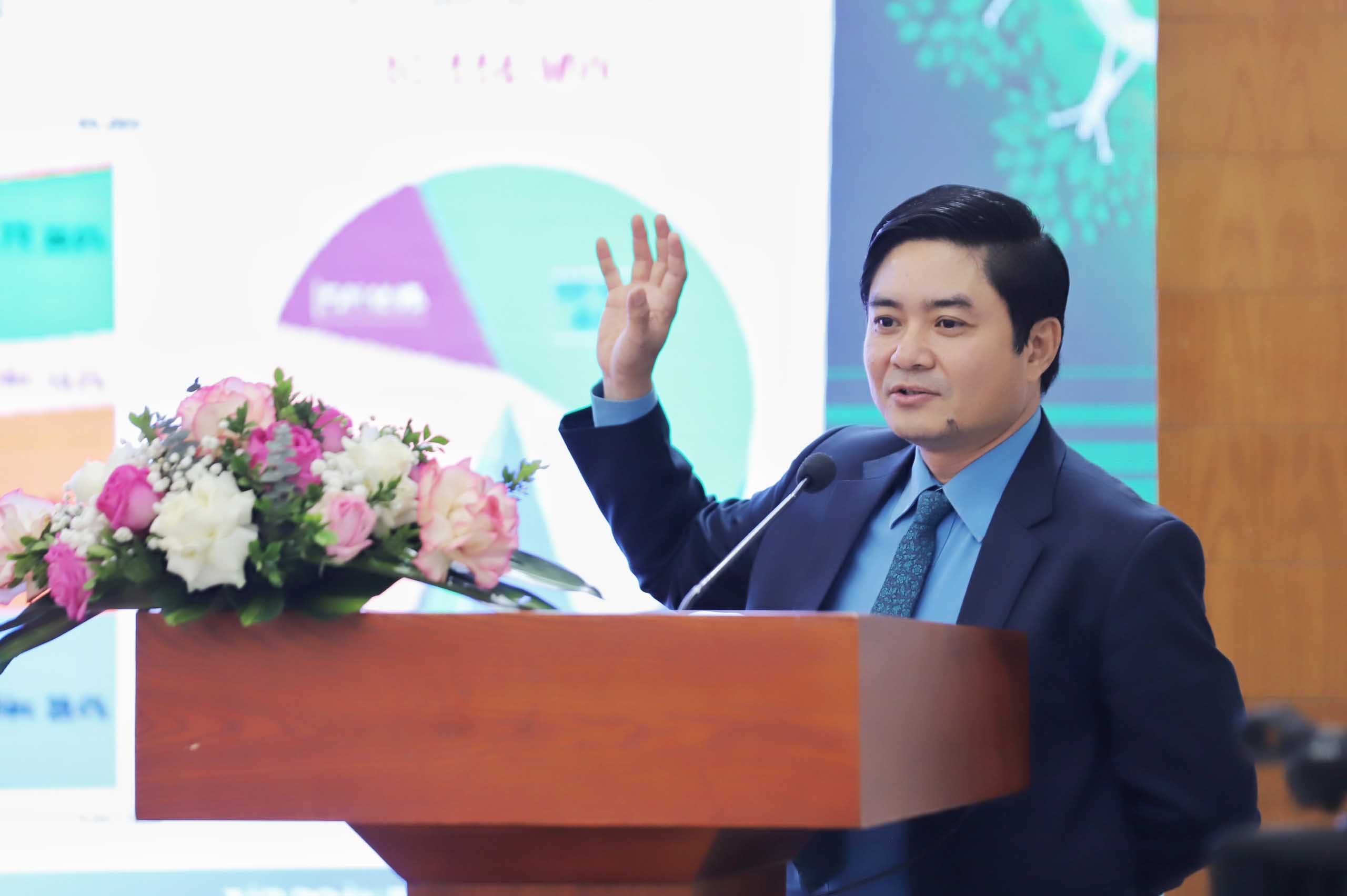
The research topics implemented in the 2013 - 2023 periods all closely follow the directions and tasks assigned by the Vietnam General Confederation of Labor to the Institute of Occupational Safety and Health Science in the operational orientation for the 2010 - 2015, 2016 - 2020, 2021 - 2030 periods.
Most of the research topics have practical and applicable results, which are sought to be applied by small and medium-sized production establishments. The products of the research projects in the period 2013 - 2023 meet the needs of ensuring occupational safety and hygiene and environmental protection.
According to Dr. Tho, the results of scientific research and development activities on occupational safety and environmental protection of the Institute of Occupational Safety and Health Science are highly appreciated with about 50 outstanding products.
Regarding the results of occupational safety, health and environmental protection services, the institute's units have conducted environmental monitoring up to 2022 for 7,577 units, and it is estimated that by the end of 2023, environmental monitoring will be conducted for about 8,805 units. The monitoring results show that about 32% of the monitored units have at least 1 harmful factor that does not meet occupational hygiene standards.
Environmental monitoring results have contributed to consulting and helping businesses implement measures to improve the environment and working conditions, minimize the negative impacts of harmful factors to help prevent occupational diseases.
During the monitoring process, a number of new factors were also discovered in the working environment for which Vietnam has not yet regulated occupational exposure thresholds. This is the basis for proposing to add and update the list of occupational exposure thresholds for these new harmful factors.
Regarding training results, occupational safety, hygiene and environmental protection training: Conduct occupational health training, first aid training for workers at enterprises: By the end of 2022, training will be provided for about 200 units and by the end of 2023, training will be provided for about 230 units.
Conduct occupational safety and health training for 151,363 people with 1,577 classes by the end of 2022. It is estimated that by the end of 2023, 160,619 people will be trained with 1,647 classes.
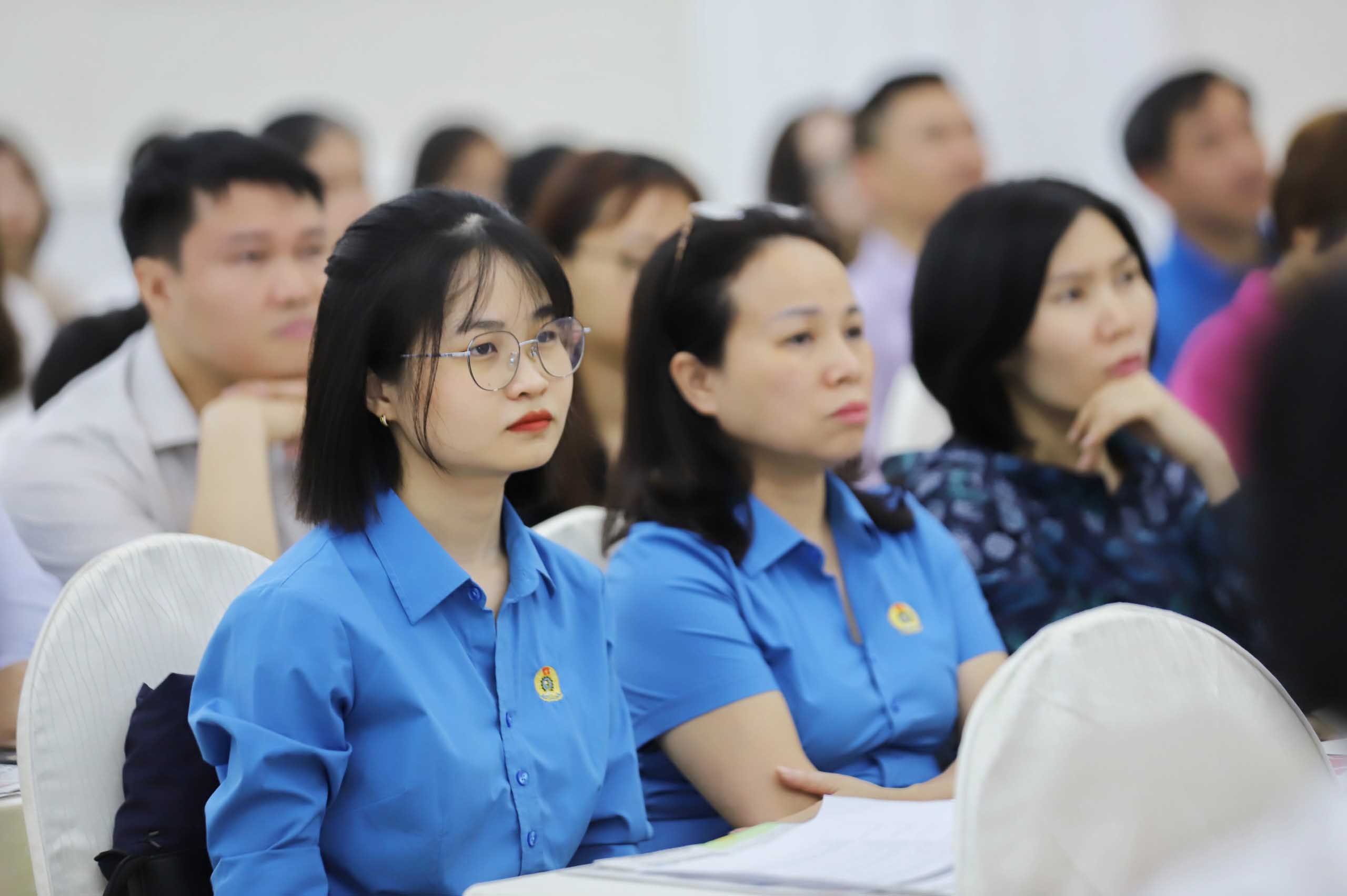
Regarding the results of periodic health check-ups and occupational disease check-ups for ministries, workers, civil servants, and employees of agencies, units, and enterprises: Each year, on average, periodic health check-ups and occupational disease check-ups are provided for about 50,000 - 90,000 people.
By the end of 2022, the total number of medical examinations will be 547,284 people. On average, 150 - 200 businesses will be examined each year. It is estimated that by the end of 2023, the total number of medical examinations will be 652,319 people with about 1,700 businesses.
Regarding the research orientation on occupational safety, health and working environment, according to Dr. Nguyen Anh Tho, in recent times, the Institute of Occupational Safety and Hygiene has conducted scientific and practical research to serve the construction and improvement of institutions and laws on occupational safety and hygiene.
Research and development, technology application, consulting, support to improve working conditions, safety culture model, prevention of occupational accidents and diseases. Basic research to orient the application of new, advanced, modern science and technology in occupational safety and hygiene activities and collect and process occupational safety and hygiene data, working environment in digital environment.
Research measures to prevent occupational diseases and develop a list of occupational diseases. At the same time, support international cooperation, receive and transfer occupational safety and hygiene technology.
15:13: Mr. Vu Minh Ly - Deputy Director of the Center for Natural Resources and Environment Communication - presented a paper on "Outstanding transformational applications of the 2020 Environmental Protection Law in developing a circular economy and combating plastic waste".
The circular economy (CEE) is a system in which resources are recovered or reused, and waste streams are converted into inputs for further production. This activity has been driven by rapid urbanization, climate change, technological advances, and the growing demand for limited natural resources.
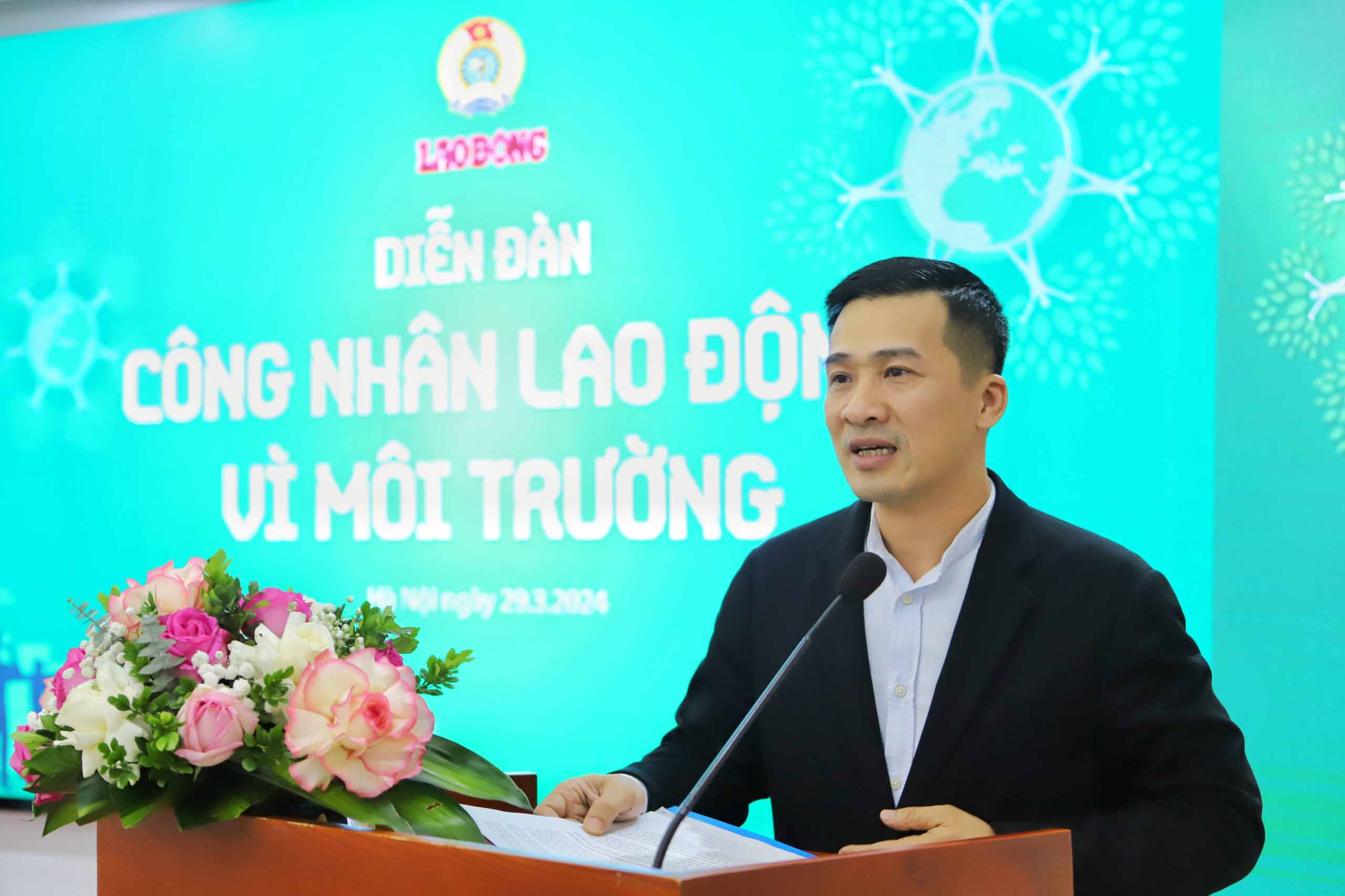
The development of science and technology is contributing greatly to the development of circular economic models, contributing to achieving all the goals of quality management such as prevention, reduction, monitoring, classification, collection, transportation, reuse, recycling and waste treatment.
Digitalization practices can be applied to contribute to achieving all the goals of quality management such as prevention, reduction, monitoring, classification, collection, transportation, reuse, recycling and waste treatment.
At the level of individual production and business models, enterprises can apply digitalization to promote cleaner production, design and manage products according to ecological criteria; form green shopping channels from the consumer sector; develop product recycling and reuse systems, and form waste treatment plants that operate effectively on a modern and digital technology platform.
At the regional level, promoting the application of digital technology to industrial management, developing models of symbiotic industrial parks, ecological industrial parks, opening markets and facilitating trade for products, goods and services related to circular economy.
At the state management level, digitalization will contribute to improving efficiency and effectiveness in activities such as automatic monitoring, data collection, management and analysis, emission source control, effective data use, support for forecasting, warning, and timely incident response.
Circular economy is not only mentioned in the policy, but also researched and institutionalized into regulations in the 2020 Law on Environmental Protection and the system of guiding documents.
Workers are the pioneers in implementing environmental protection commitments. There have been many innovative ideas coming from the grassroots and from workers. Propose awards to honor ideas and individuals who have made great contributions to environmental protection.
We propose that Lao Dong Newspaper open more columns to introduce environmental protection initiatives from workers. In addition, we also suggest that business owners pay more attention to implementing green factories, contributing to environmental protection as well as protecting workers.
15:00: Shifting power source structure to avoid negative impacts on the environment
At the forum, Mr. Vu Van Minh - Head of Legal Policy and Labor Relations, Vietnam Electricity Trade Union - said that with the orientation of becoming a responsible enterprise to the community, "safe, green and clean production", in recent times, Vietnam Electricity Trade Union has paid great attention to environmental protection.
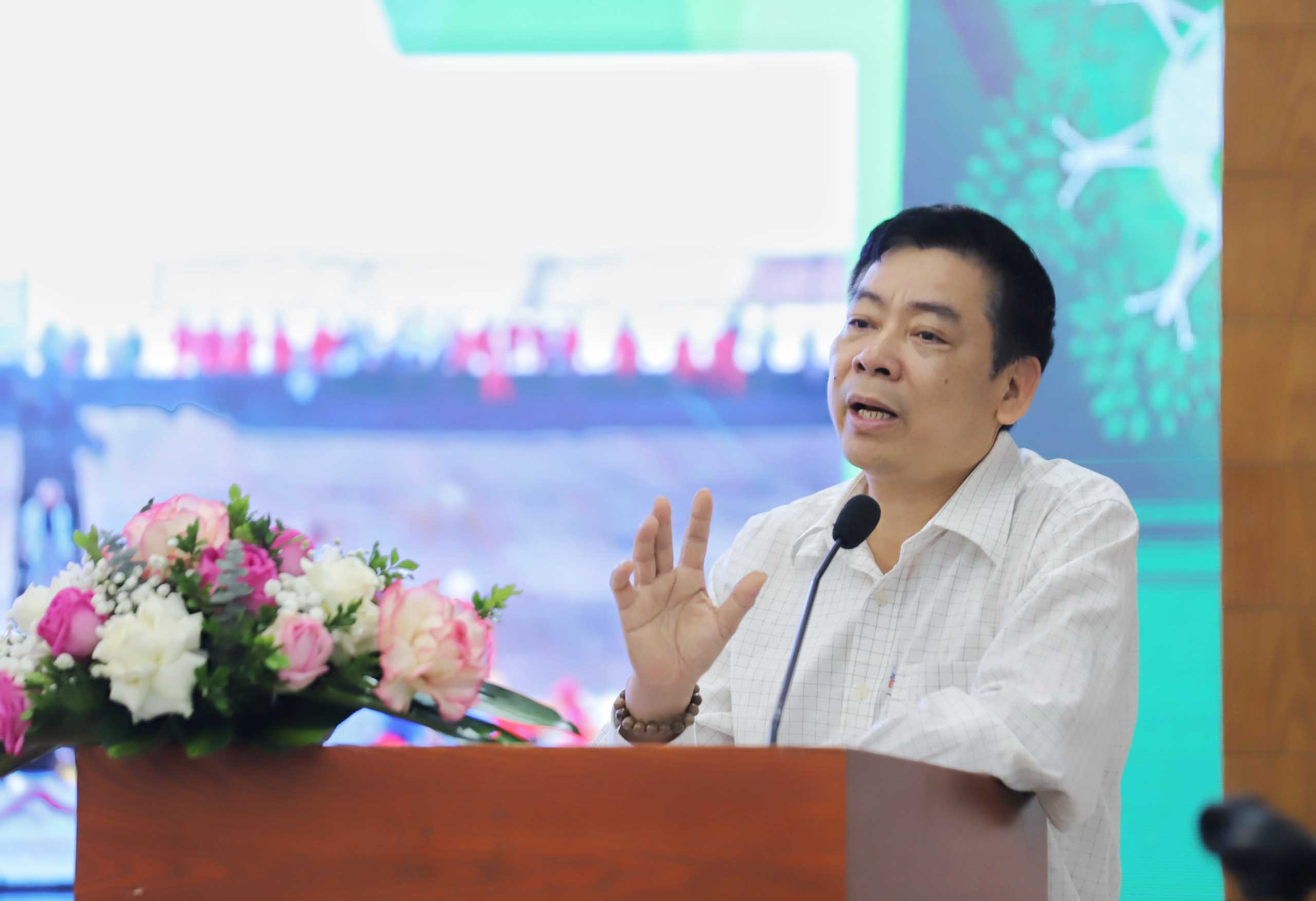
In the process of investing in construction, production and transmission of electricity, to reduce negative impacts on the ecological environment, investors, managers and employees in the industry must be aware of environmental protection. Vietnam Electricity Trade Union always accompanies employees in environmental protection work.
According to Mr. Minh, EVN has seriously implemented environmental management measures throughout the investment and project construction stages until the plants come into operation; investing in modern technology to treat circulating water, exhaust gas, and ash and slag. Accordingly, all EVN thermal power plants have invested in building wastewater collection and treatment systems to ensure compliance with QCVN 40:2011/BTNMT for industrial wastewater and QCVN 14:2008/BTNMT for domestic wastewater before being discharged into the environment. Wastewater after treatment meets the standards and is partially reused, returning to the production process.
Over the years, Mr. Minh said, EVN has actively responded to the Earth Hour campaign. This is one of the annual global events on environmental protection, with the participation of many countries and territories. The Earth Hour campaign has created a huge change in awareness as well as in the actions of people around the world in saving energy and protecting the environment.
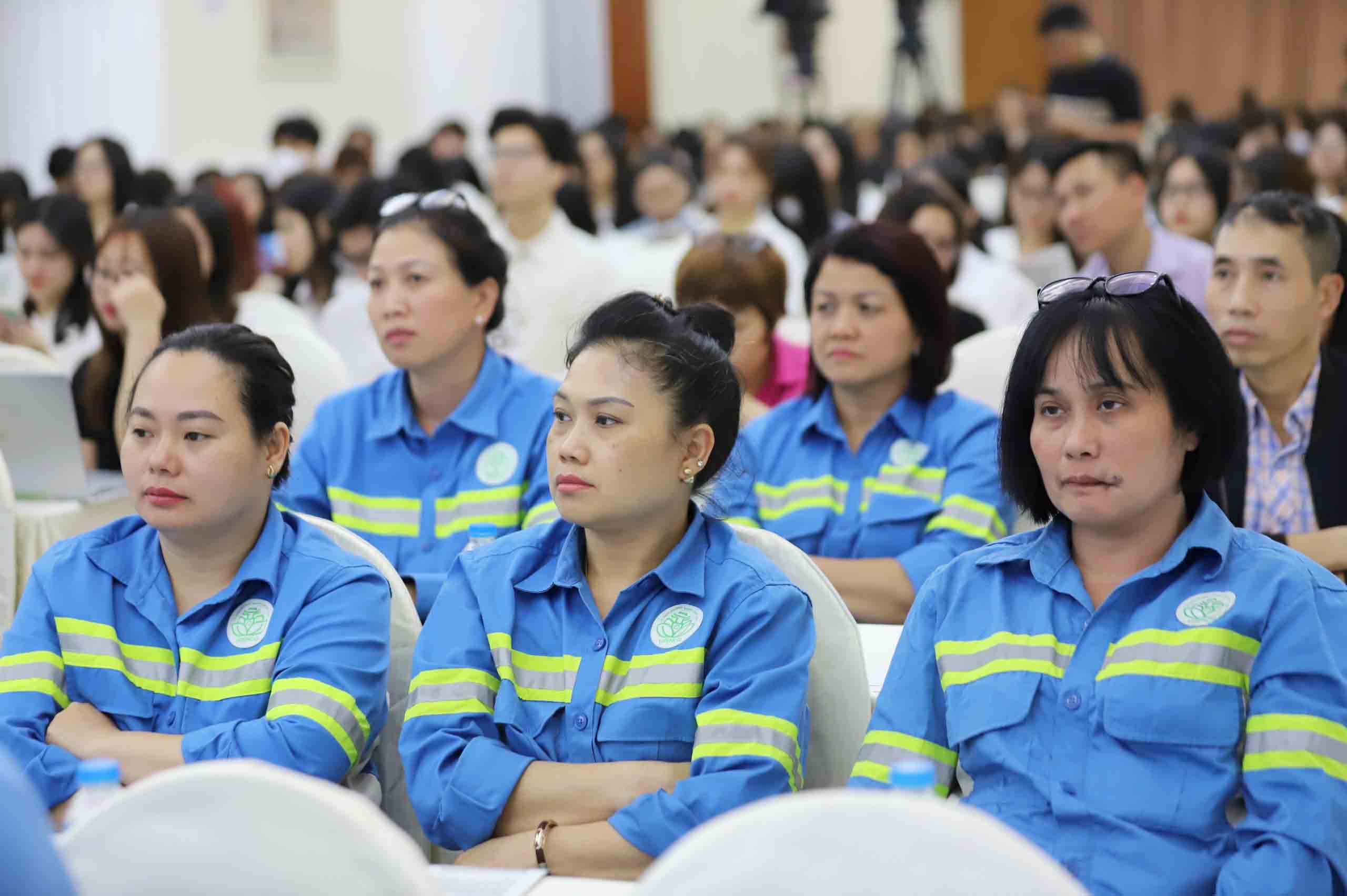
The Earth Hour event in 2024 in Vietnam took place with the message "saving electricity - making it a habit" sent to the community with a call to save electricity, save energy and protect the environment.
Through data on national electricity consumption, the National Power System Control Center said: After 1 hour of turning off the lights in response to the Earth Hour Campaign 2024 (from 8:30 p.m. to 9:30 p.m. on March 23, 2024), the whole country saved 428,000 kWh of electricity (equivalent to about 858.9 million VND).
The restructuring of power sources: bringing wind and solar power plants into the system, limiting the development of coal-fired thermal power and hydropower will reduce some of the negative impacts on the environment, which is a great effort of the Vietnam National Electricity Group.
14:37: Ms. Hoang Thi Bich Hanh - Vice President of the Trade Union of Hanoi Urban Environment Company Limited (Urenco) - presented a paper on "Challenges in collecting plastic waste and the issue of improving knowledge for collectors in the waste classification stage".
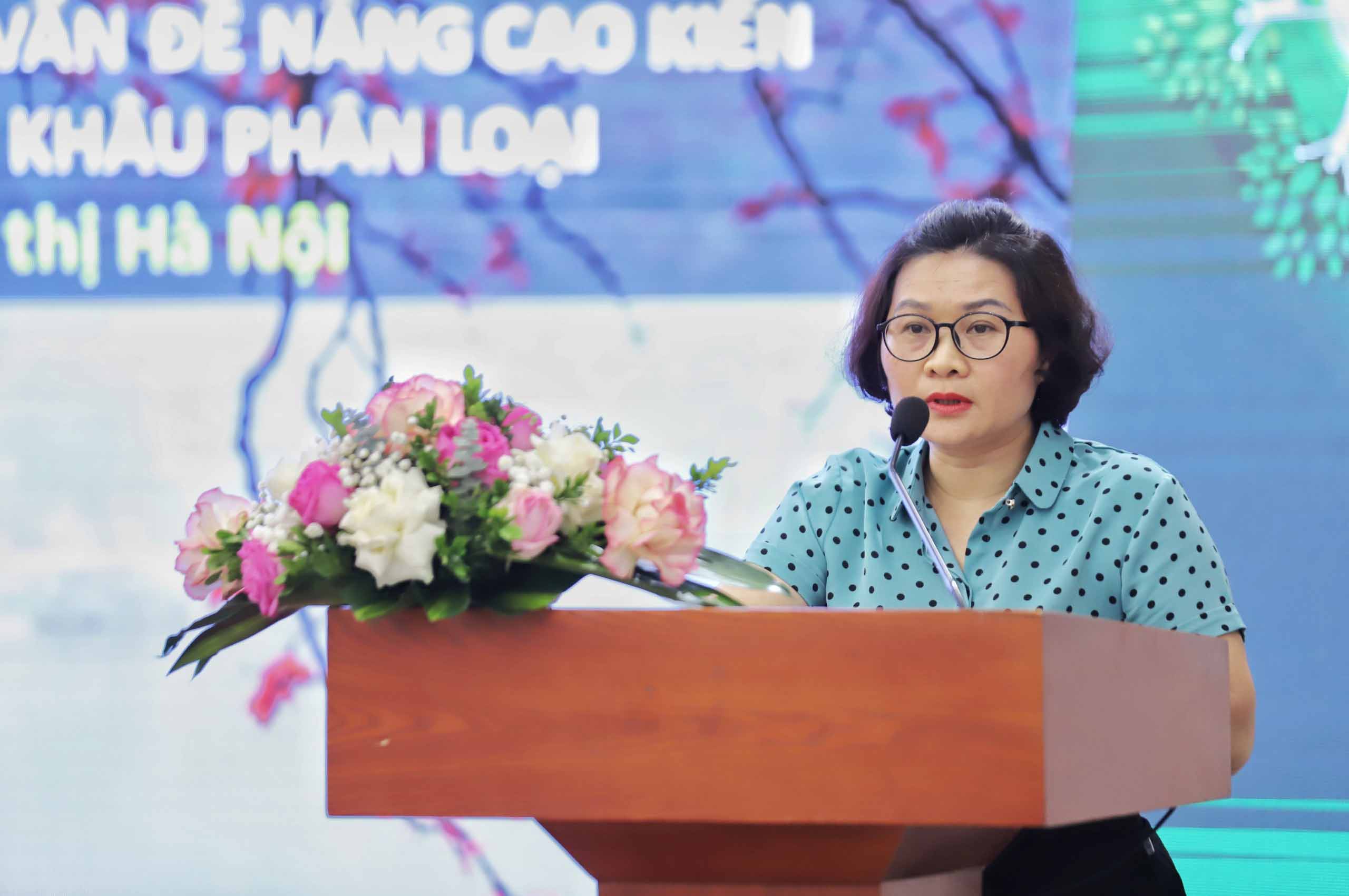
Plastic waste is a global problem, including in Vietnam. In Hanoi alone, there are 7,000 - 7,500 tons of household waste every day, of which 8 - 12% is plastic and paper waste.
Difficulties still exist in garbage collection such as: leachate flowing onto the street, collection causing traffic jams and lack of public trash cans.
Currently, waste classification has not been implemented regularly, widely and synchronously with collection and treatment activities. This work has only been piloted in some large cities. Most of the waste has not been classified before collection. The recycling rate is still low (average 5%). Recycling activities also cause environmental pollution.
Currently, the work of environmental workers is quite hard, focusing on cleaning roads, streets, high population density, large amount of garbage generated every day. The large amount of work makes the collection and classification of waste difficult, especially plastic waste. In particular, the collection and classification of plastic waste is still very difficult.
Or even if there is classification, there is still a situation where recycling collectors freely dig and pick up recyclables in trash bins, often causing a messy situation around the area where recycling is picked up, causing unsanitary conditions and losing the urban beauty.
According to Ms. Hoang Thi Bich Hanh - Vice President of the Trade Union of Hanoi Urban Environment Company Limited (Urenco), improving the knowledge of garbage collectors is necessary to improve collection efficiency and protect the environment.
Currently, Urenco is implementing a recycling collection program for workers. The program is being piloted in Ba Dinh, Hoan Kiem, Hai Ba Trung, Dong Da, and Nam Tu Liem districts every Saturday or Sunday. Initial results have established the recycling industry as a key industry.
According to Ms. Hanh, it is necessary to propagate and guide people; there must be economic policies for people to participate in sustainable plastic recycling. For example: Reduce costs if waste is classified; there must be policies to support businesses in recycling. For example: policies to reduce VAT for businesses.
Ms. Hanh also gave some solutions such as distinguishing common types of plastic by: looking at the symbols on the bottom or body; distinguishing based on the natural color, transparency of the sample; comparing thermal properties (simply burning): if you light a lighter and there is no burning smell, it is PE, HDPE or PP, PET, ABS plastic burns with a flame that has black smoke and a burning smell, while PVC plastic does not burn into a flame; check the hardness of the plastic.
Urenco representatives also emphasized that improving knowledge for workers in the waste classification process is very necessary. Because, proper management and reuse will bring economic benefits, save fossil fuels, and contribute to sustainable development.
14:25: Raising awareness among workers in environmental protection and combating plastic waste
According to Mr. Do Viet Duc - Labor Relations Department of the Vietnam General Confederation of Labor, with the function of participating in the development of legal policies, including regulations on environmental protection, the Vietnam General Confederation of Labor has participated in the development of the 2020 revised Law on Environmental Protection and documents guiding the implementation of the Law on Environmental Protection such as decrees, circulars, standards and regulations on environmental protection to strengthen the legality and effectiveness of state management of environmental protection.
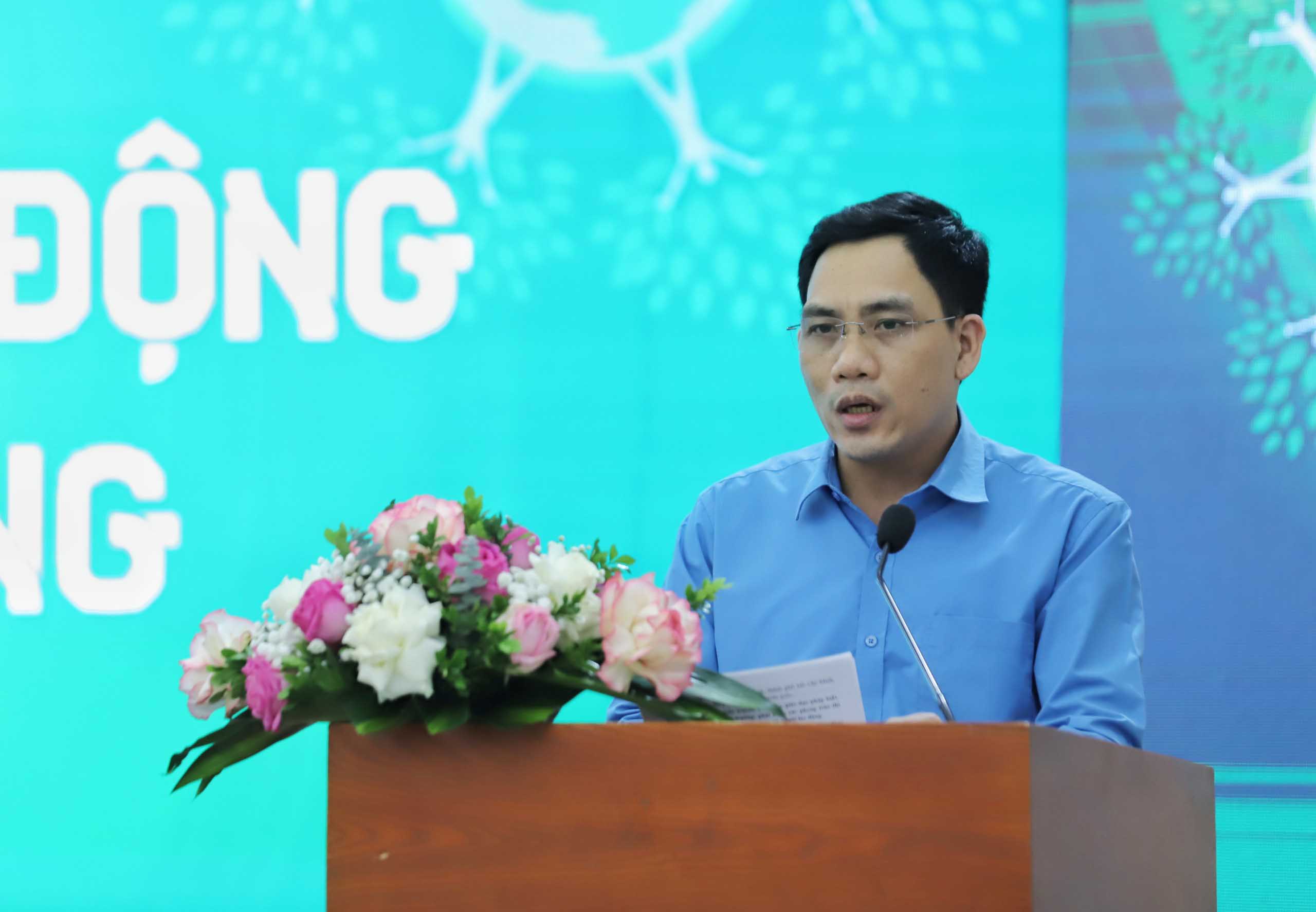
Based on the guidance and direction documents of the Vietnam General Confederation of Labor, trade unions at all levels have issued Plans and organized propaganda to mobilize union members, employees, and grassroots trade unions to coordinate with employers to carry out many practical activities contributing to environmental protection, such as organizing tree planting and flower gardens to create green - clean - beautiful landscapes in enterprises and units; improving techniques and equipment to reduce energy consumption and toxic waste to the environment...
Regarding the work of propaganda, dissemination, legal education, knowledge about environmental protection; launching emulation movements among cadres, civil servants, public employees and workers to preserve the landscape of enterprises, agencies and units, according to Mr. Do Viet Duc, in 2023, during the month of action for the environment in response to World Environment Day, trade unions at all levels will organize many activities to inform, propagate and disseminate about the month of action for the environment in response to "World Environment Day" with the theme of fighting plastic waste.
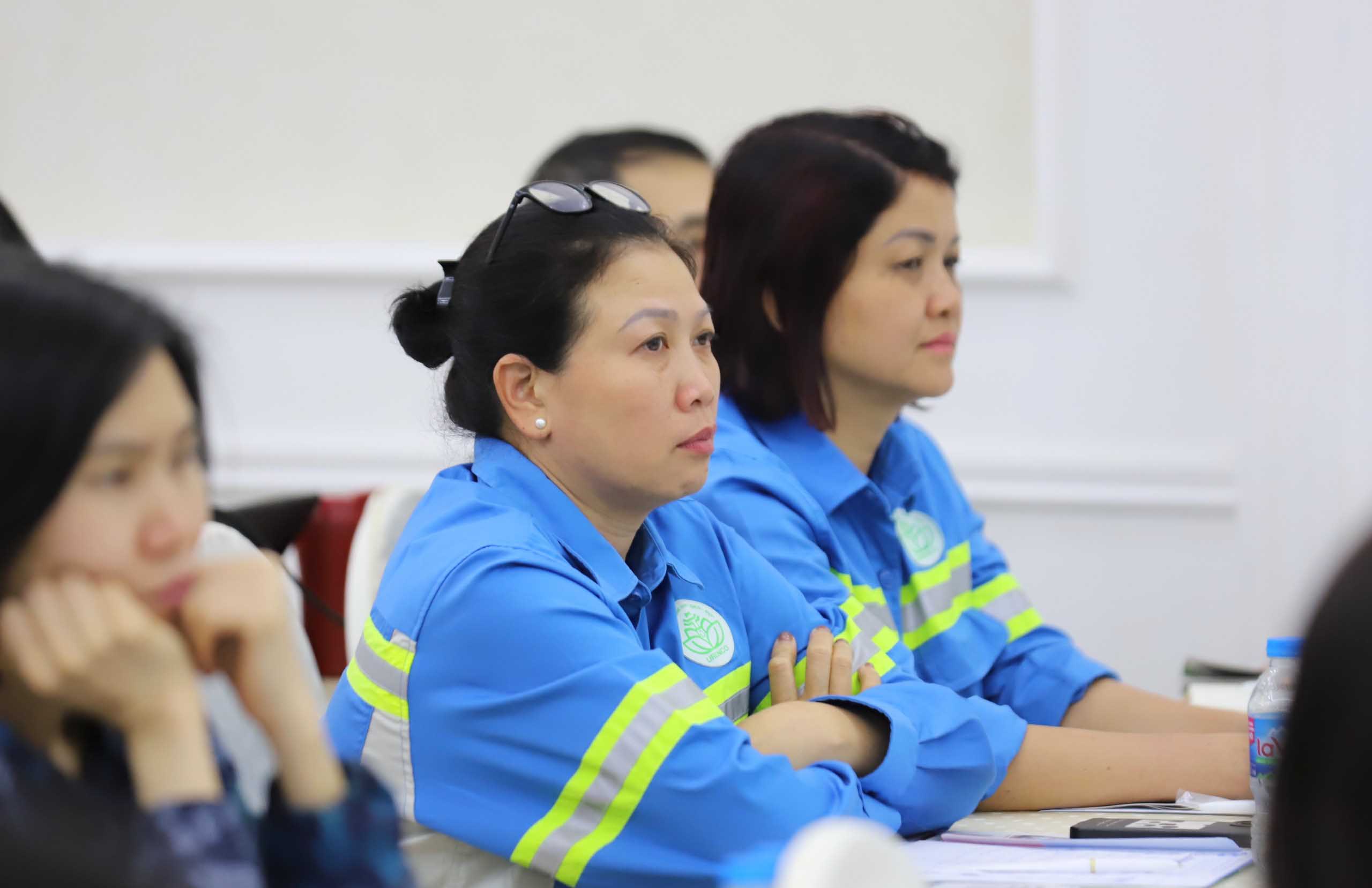
Many localities, units and establishments, based on their actual conditions and situations, have been creative and innovative in choosing appropriate implementation forms such as hanging billboards, posters, propaganda slogans, disseminating contents on environmental protection and biodiversity conservation, natural resources, and climate change response in the areas of agency headquarters, enterprises and industrial parks.
Many propaganda messages, concretizing the theme of responding to "Ecosystem Restoration" and "We are part of the solution - For nature" in 2023 to raise awareness and responsibility of employers, union members and employees about environmental protection, living habits and environmentally friendly lifestyles;
Use energy and natural resources economically and efficiently and be reminded regularly such as: "Say no to plastic bags and plastic waste"; "Take action to reduce plastic and nylon waste pollution"; "Say no to single-use plastic products"; "Turn plastic waste into money"; "Exchange waste for trees"; "Join us to fight air pollution"...
In 2023, the Trade Unions at all levels organized 6 competitions; printed and distributed 602,393 leaflets, slogans, and posters on environmental protection; had 11,583 radio and television broadcasts, talk shows, training sessions, and knowledge dissemination; had 3,279 news bulletins, articles, reports, and briefings at enterprises on environmental protection to propagate to 424,779 union members and workers.
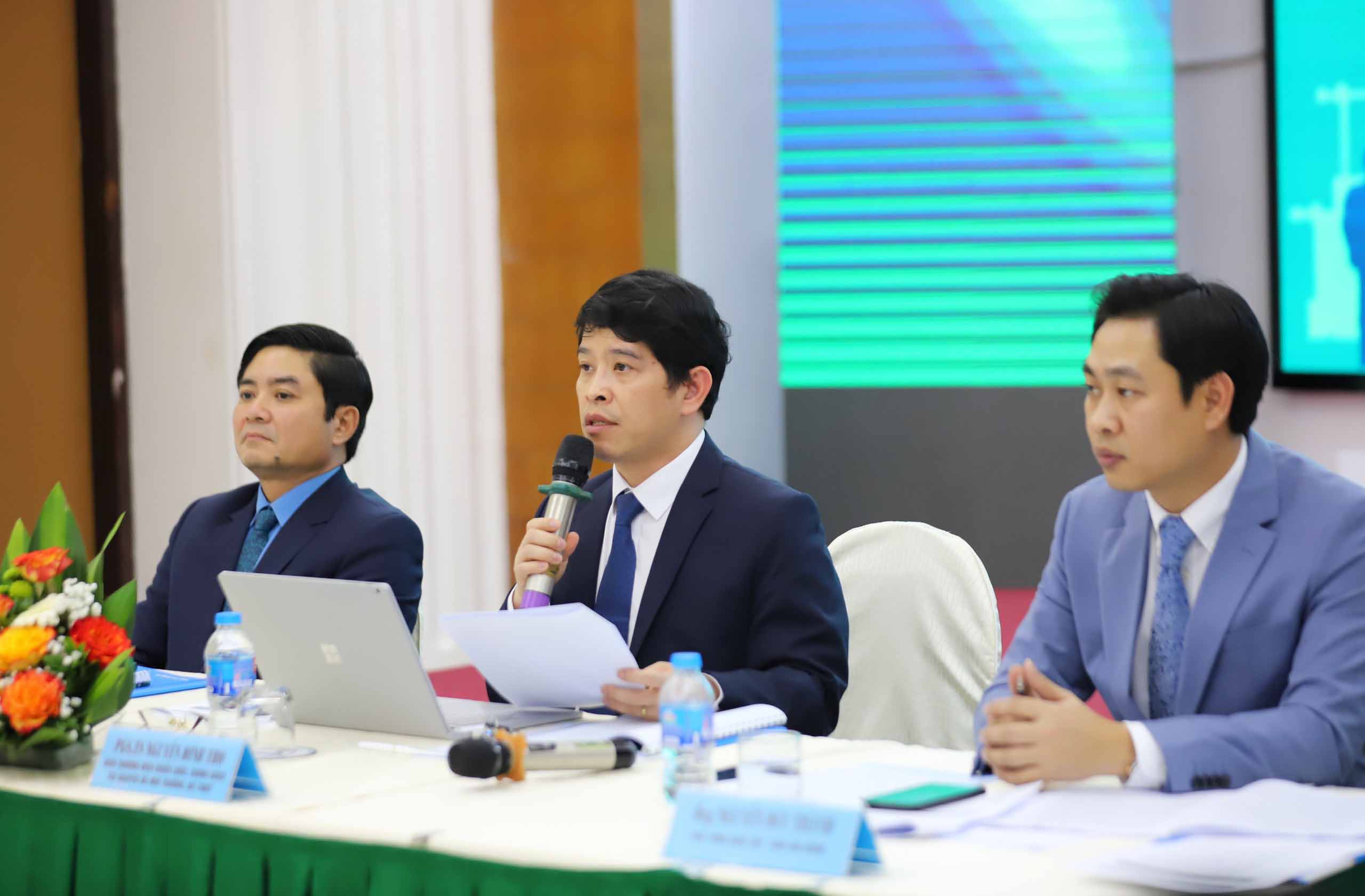
The campaign team launched a general cleaning campaign to clean the environment, offices, workplaces, public areas, residential streets, clear bushes, and clear sewers on 1,794,121 km of land, and 899,032 km of roads at environmental points, changing the appearance, landscape, and making the environment cleaner and more beautiful;
Over the years, the Institute of Occupational Safety and Hygiene under the Vietnam General Confederation of Labor has carried out many scientific and technological programs and tasks and tasks serving State management of environmental protection, such as implementing the task of developing basic standards for methods to determine PM10 and PM2.5 dust in ambient air by the weight method.
Environmental protection monitoring activities have been gradually improved. Local Labor Federations and Industry Unions have established environmental management focal points to contribute to improving the capacity to monitor and handle violations of environmental protection laws.
In the coming time, the Vietnam General Confederation of Labor will continue to direct trade unions at all levels to further strengthen propaganda activities and raise awareness among union members and workers about environmental protection and climate change response;
Mobilize and increase resources for environmental protection activities, contribute to solving environmental problems with businesses, promote growth, create income and sustainable jobs for workers.
14:07: Mr. Duong Trung Thanh - Chairman of the Ministry of Natural Resources and Environment Union - presented a paper "How are the Party's policies and the State's laws on environmental protection being implemented among workers and laborers?".
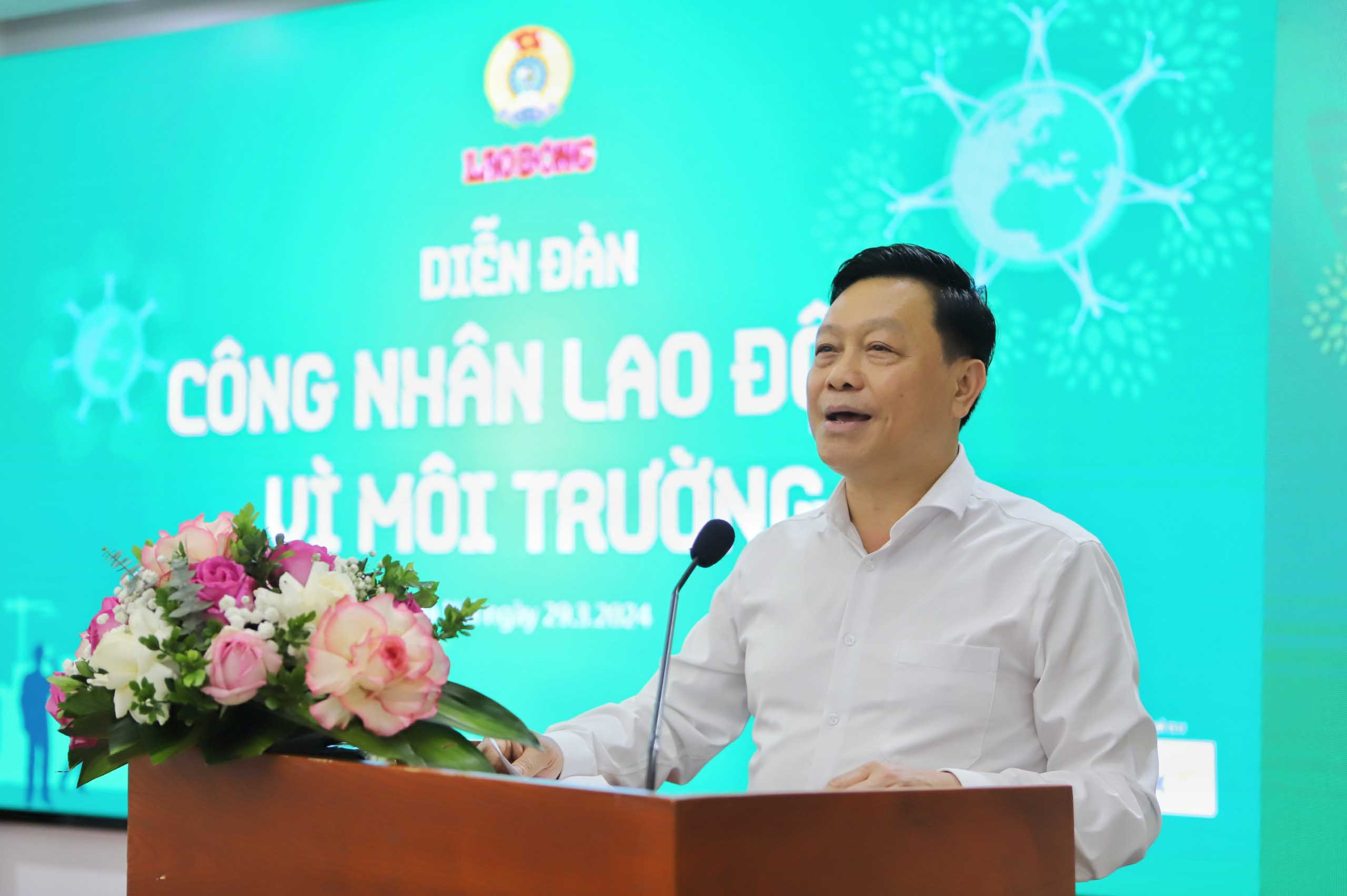
Regarding plastic waste prevention, if the 20th century was the revolutionary era of the plastic industry when too many plastic products were produced, then the 21st century is the time to face its consequences.
Improper management, lack of information about its negative impacts and irresponsible use and littering of plastic products have turned this planet into a “plastic planet”. It not only pollutes the terrestrial ecosystem but also pollutes our oceans. With the rapid growth of the economy and society, the problem of environmental pollution is inevitable.
Realizing the harmful effects and negative impacts on the environment, and demonstrating Vietnam's role and responsibility towards the world, the Ministry of Natural Resources and Environment has advised the Government and the Prime Minister to issue many policies to manage plastic waste, and at the same time develop plans to implement the tasks assigned by the Government.
The officials and union members of the Ministry of Natural Resources and Environment are very aware and knowledgeable about the harmful effects of plastic waste and have taken actions to limit the use of disposable plastic (not using plastic bags at supermarkets and traditional markets; not using plastic trays/cups/bowls/chopsticks/spoons when eating and drinking and using consumer services at agencies and service establishments; classifying plastic at home and transferring it to collection establishments/individuals so that it does not mix with household waste...).
Regarding climate change response, aiming for the Net Zero goal, Vietnam is one of the countries that has suffered the most losses due to the adverse impacts of climate change (CC), as shown by the fact that weather patterns and natural disasters have recently become more unusual and the level of damage has become increasingly severe.
Although it is a developing country with many difficulties in terms of resources, Vietnam has always proactively demonstrated itself as a responsible country in implementing international commitments and responding to climate change with the world community.
In parallel with the tasks of advising, proposing, and developing policies to respond to climate change, in recent times, the Ministry of Natural Resources and Environment has presided over and coordinated with the Vietnam Fatherland Front, the Central Committee of the Ho Chi Minh Communist Youth Union, Vietnam Television, Voice of Vietnam, religions, socio-political organizations, professional social organizations, etc. to carry out propaganda activities and disseminate knowledge in localities and regions heavily affected by climate change with rich content and communication methods.
14:03: Broadcast of the report "Many localities are struggling with the problem of plastic waste pollution".
14:00: "Further promoting the role of workers in business and production activities of enterprises associated with environmental protection"
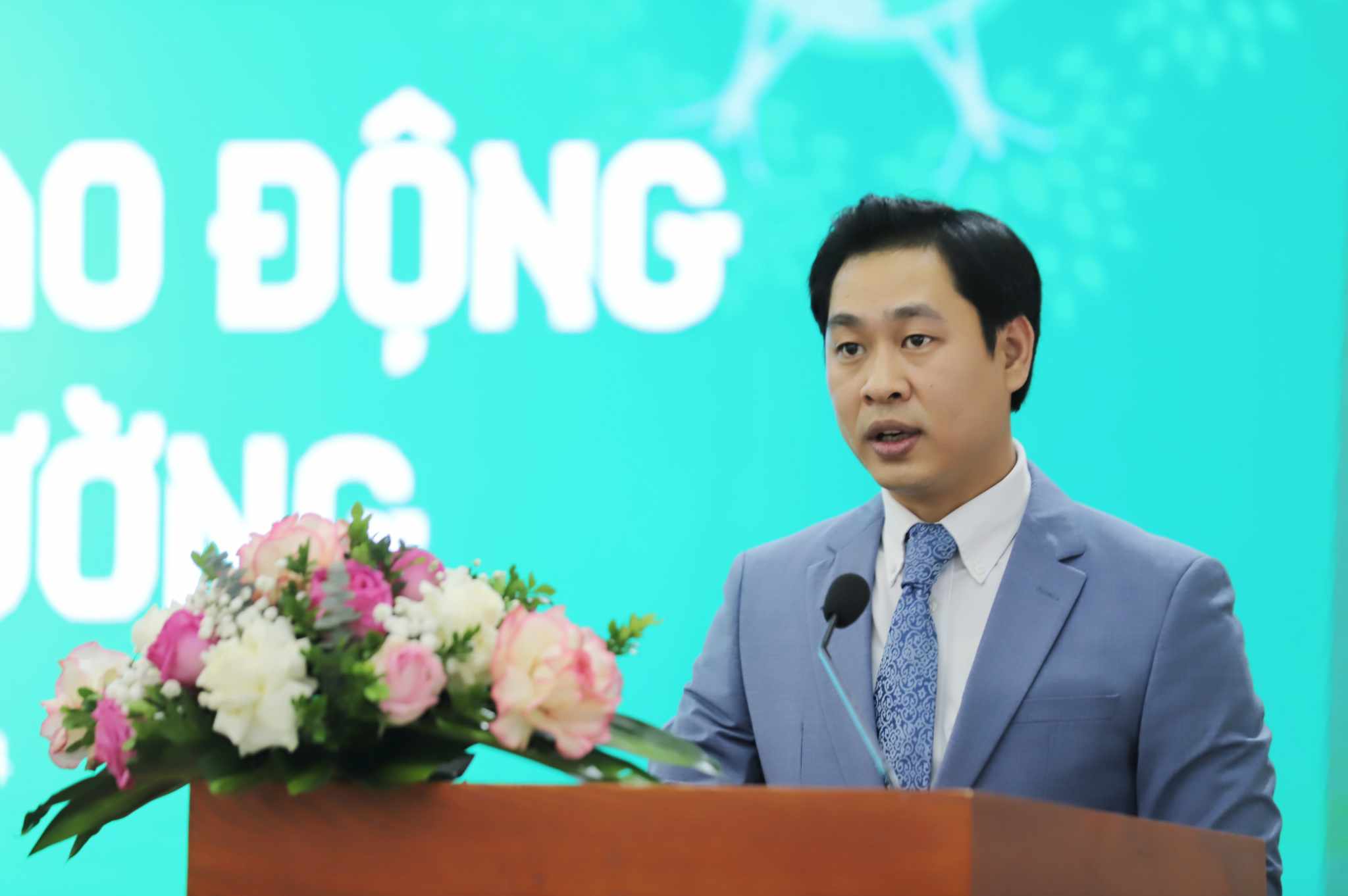
At the forum, Mr. Nguyen Duc Thanh - Deputy Editor-in-Chief of Lao Dong Newspaper said that at the COP 26 Conference, countries, including Vietnam, made strong commitments to reduce greenhouse gas emissions with the goal of achieving net emissions of "0" by 2050. In particular, the focus is on transforming the energy structure to prioritize clean and renewable energy.
Therefore, the forum was organized with the desire to propose specific solutions to promote workers' and laborers' activities to protect the environment; at the same time, further promote the role of workers in business and production activities of enterprises associated with environmental protection, promoting the active participation of grassroots trade unions in activities to monitor the protection of natural resources and the environment.
“At the forum, we hope to hear opinions from departments, ministries, businesses, workers and laborers on environmental protection,” said Mr. Nguyen Duc Thanh.
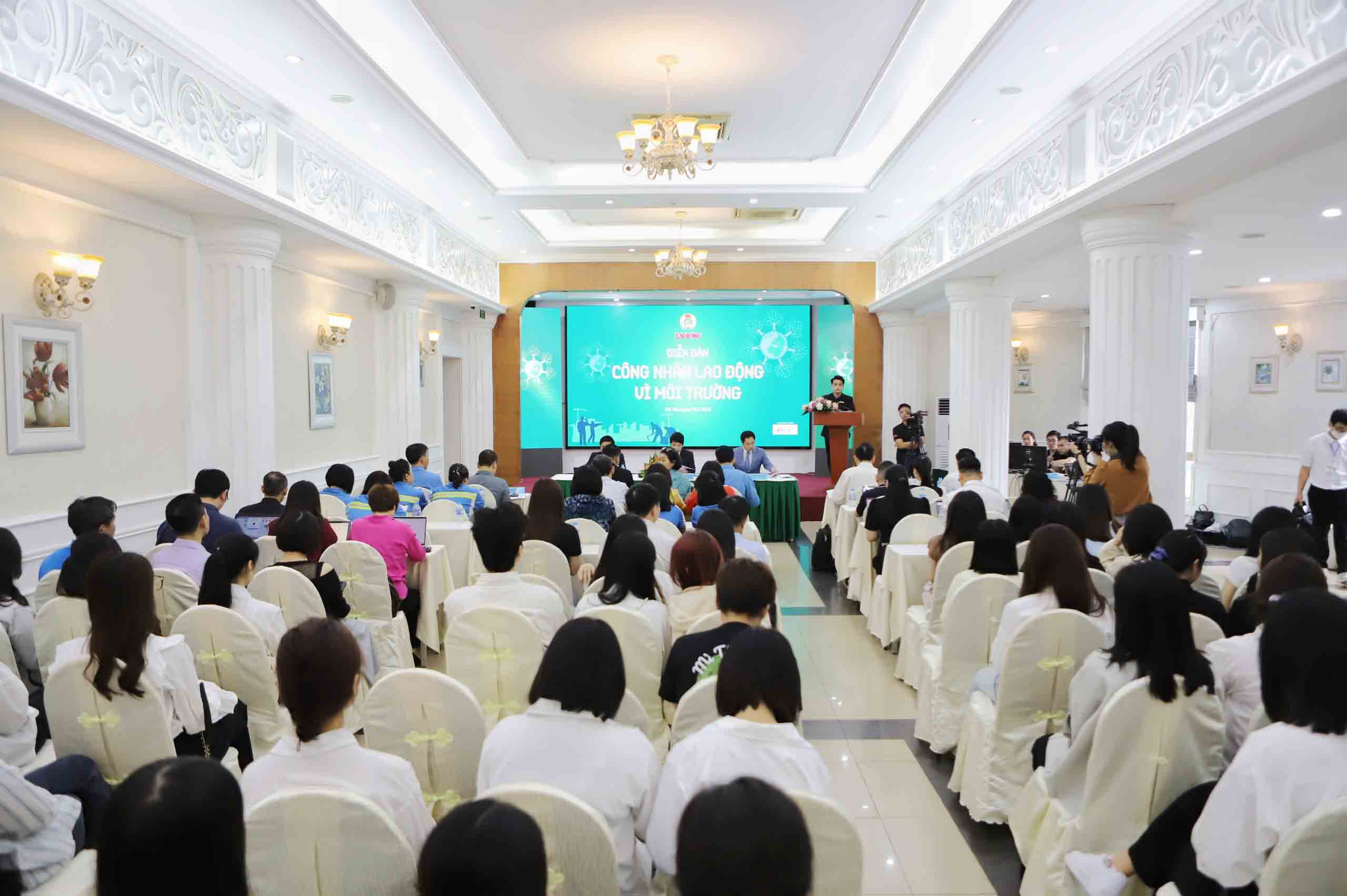
After 10 years of implementing Resolution 24-NQ/TW, climate change response, resource management and environmental protection have received more attention and focus. Climate change response has received the attention of the whole society, gradually shifting from adaptation as the focus to combining greenhouse gas emission reduction, taking advantage of opportunities to move towards a green, low-carbon economy, aiming for net zero emissions.
With the desire to propose specific solutions to promote workers' and laborers' activities to protect the environment, further enhance the role of workers in production and business activities of enterprises associated with environmental protection, promote the active participation of grassroots trade unions at all levels in activities to monitor the protection of natural resources and the environment at enterprises nationwide, and at the same time highlight initiatives of workers in environmental protection, Lao Dong Newspaper (Vietnam General Confederation of Labor) organizes the "Workers' Forum for the Environment" in 2023.
The forum was reported online on Lao Dong Electronic Newspaper (www.laodong.vn).

Continued update...


